#mirror linking to aspect ideologically
Explore tagged Tumblr posts
Text

Land of mirror and ruses
A hot desert world with broken glass strewn across the sand, twisted mirror spires and distant mirages.
Mirror in reflections, truth and self. Ruses in illusion, deceit and trickery. Both in common with fragility while also coming together as funhouse mirrors or mirror mazes (denizen dungeon)
Denizen dungeon would be Scam likely's funhouse with different challenges but purposely same. The denizen itself would have the role of tori
#dndadstuck#mirror linking to aspect ideologically#reflections in how the story uses fractered identites of scary to explore her inner turmoil#ruses corrolating to the front she puts up to others#deceit w her betrayal#the sharp mirrors and glass stems from scary as a person#especially her role as a glass canon#the heat of the dessert contrasts to how (at least in my design) many layers of cloths scary has on and the battle between that#visual representation of whether outside circumstances & influences can sweat her out or her resolve to keep her barriers up will prevail
0 notes
Text
So I guess tumblr isn't embedding Newsmax links (wonder why) so I urge you all to give this a read:
European Censorship Spells Danger to Our Bill of Rights
The campaign to pass the misnamed Kids Online Safety Act (KOSA) mirrors censorship efforts in the UK and EU dressed up as helping kids. Don’t be fooled. The effort to empower the federal government to moderate content is nothing more than a power grab for bureaucrats to become the gatekeepers of what speech is OK and what's not. Parents, not government, should be the gatekeepers for what children view online. Conservatives do not support a nanny state view of governance that includes unelected bureaucrats making decisions on how social media companies operate. The KOSA legislation has been rewritten a few times but, in a nutshell, imposes a "duty of care" which would force content-based changes on many online services. The bill purports to protect kids from substance abuse, eating disorders and suicidal behaviors, yet will impose an age requirement on platforms that will make politicians feel good, yet not solve the problem. According to the Electronic Frontier Foundation (EFF), the most recent draft “remains, at its core, an unconstitutional censorship bill that threatens the online speech and privacy rights of all internet users."
Don't be so eager to fall in line with anything that claims to "protect children". I know we're all rightfully mad at things like the UK rape gags, child trafficking, gender ideology targeting children, and similar things, but don't let that anger override your common sense. ANy censorship powers you give the government over one aspect of the internet will be expanded to others. If you want to join the UK in waking up to police knocking on your door to arrest you over a tweet you made a year ago, then go ahead and support things like KOSA and Florida's ID to access porn sites law. If you value free speech and understand that it's the parents duty and right to decide what their kids do online, then you can't support these kinds of laws.
21 notes
·
View notes
Text
Sooo, as has been evident from me rambling so often about it, I’ve been reading a lot of Genshin fics lately (specifically Sumeru centered ones), and it is so funny to see how headcanons and AUs change between the releases of the characters.
Ofc, this sticks out to me especially with Haikaveh cos Kaveh got released so late for showing up so early and ppl ran far with their ideas. One of the biggest theories was (and I think still kinda is) is that Alhaitham is or at least is linked to the Scarlet King bcs his eyes have the same shape as the eye portrayed in the Forbidden Knowledge cutscene.
After the quests came out where you find out about King Deshret’s and the Goddess of Flowers’ relationship, ofc ppl started to push Alhaitham and Kaveh in the respective roles, which, ngl, I totally vibe with. Even more so cos I can only image the Goddess of Flowers with Nilou’s kinda personality (since her outfit is supposed to look like the Goddess) and the thought of her reincarnation still being good hearted beyond believe, yet also a fucking idiot with anger issues is so fucking funny.
However, the theory I personally even more subscribe to, is that both Alhaitham and Kaveh, at least in an design aspect, represent the Scarlet King. I cannot by God find the one vid that talked about it, but they laid out a lot of design specifics that rly did make sense. This ofc, made me think a lot about it too.
Alhaitham could represent King Deshret’s mind and rational side, the part of him that made him a genius and good leader. As much as Alhaitham acts as if he sucks as a leader, which from a personality standpoint might be true, his abilities and critical mind say otherwise. Alhaitham is strategic and very wise for his age, but also curious and ambitious about the knowledge he seeks. He is not without fault either, as, despite him saying he acts only out of self interest, he still does act very arrogantly and above others.
Kaveh on the other hand shows King Deshret’s soul. Clever and curious in his own right, Kaveh seeks out knowledge not only to learn and understand but because his emotions drive him to reach for it. Kaveh has a bleeding heart and follows its voice more often than his mind’s, yet that makes him empathetic to people and care about them, which we know the Scarlet King was known for as well (caring for his people, that is). His emotions and self-sacrificial nature are his crux as well, though, and lead him close to his own downfall time and time again, much as it happened with King Deshret.
Both Alhaitham and Kaveh make up the body. As is evident how haywire the theories went when the Forbidden Knowledge quest came out, Alhaitham’s eyes bear a strong physical resemblance to Deshret’s supposed eyes. Not to mention, we know Deshret is often described as powerful, so I wouldn't be surprised if Alhaitham’s body build is part of that too. For Kaveh, in that one video I mentioned they said that Kaveh’s attire seems to represent some sort of royalty. Also, in a world quest, though I don’t remember which one (i think either aranara or djini) the NPC you travel with says the traveler reminds them of King Deshret, especially the golden hair, which ofc also works for Kaveh.
(Mind you, I havent dived that deeply into Deshret lore and I did zone out during the world quests often, so pls do correct me if I say sth stupid.)
So yeah, the two sides of the same coin. We already know these two have been designed as perfect mirrors to each other, in their ideologies, personalities all the way to their colour schemes, but with regarding the headcanon they’re both aspects of the Scarlet King, it’s also an interesting analogy to think it’s Deshret’s different sides clashing with each other.
Yes, yes they’re basically the Left Brain Right Brain meme for King Deshret.
Also, as I’ve said, I’ve read my fair share of fics with the Scarlet King reincarnation, which is usually Alhaitham. I am honestly too lazy to write a whole ass fic about it, but you can bet your ass my mind has conjured up enough stuff to fill a few pages. To finally get it outta my head tho, I will just ramble here instead.
I personally don’t think that Alhaitham and Kaveh are reincarnations of Deshret, even though it’d make sense why his body and mind would be two separate entities, as he split himself to avoid spreading more Forbidden Knowledge. I see it more as the two being “blessed” with parts of his soul or something.
Ngl, the whole thing came to me during the one World Quest where you clear up the sandstorm above King Deshret’s Mausoleum and you get to this big platform on top. I dunno, it just looked so cool and it made me think of how this could have been a ritual site or something. So, perfect place for some foreign memories to invade your brain, no?
Also, you cannot tell me the Akademiya wasn’t frothing at the mouth when the Mausoleum finally became accessible. I’d assume they’d send research teams up there after the Traveler cleared the place, and it would seem logical for both Alhaitham and Kaveh to be interested in the place, their respective curiosities spurred by the fragment of Deshret inside them.
They and a small group of scholars take it upon themselves to scope the place out, and eventually end up at the top of the pyramid. Kaveh would marvel at such a grand stage so high up in the air, being able to see into the far reaches of the desert. But he also feels trepidation in his soul, though he brushes it off.
Alhaitham and him conduct their respective researches, Alhaitham jutting down any interesting runes and scripts he finds on the podium, while Kaveh sketches the many columns and the scenery behind, his mind running wild trying to understand how such impossible structures hold. But as he stands at the edge, looking out upon the empty desert with its many ruins, a thought pops into his head.
The desert should not be dead like this.
It’s then that Kaveh feels something shift inside him. Sensations rush over him, the sun beating down on him so differently than just moments ago, the air smelling not of sand and dust but of spices and flowers, the stillness of the desert filled with the distant rush of a city well lived in and people calling him yet not shouting his name.
Kaveh stumbles back to the middle of the podium, only for Alhaitham to meet him halfway. They stare at each other with wide eyes, stare at the other but seeing reflections of themselves. Kaveh bores into Alhaitham’s intense gaze, seeing the many questions and the fierce determination to solve each and everyone of them reflect in those piercing pupils of his, and thinks:
Only a gaze as steeled as mine is fit for a king.
Alhaitham roams his eyes over Kaveh, over his golden hair reflecting the sun, making it almost blinding to look at, over proud shoulders, pushed back to straighten his stance, over calloused hands, twitching in the need to create, and thinks:
Only a presence as loud and vibrant as mine can win over my people.
The spell is broken as fast as it had come when one of the scholars of their group asks for their assistance. Kaveh and Alhaitham busy themselves with helping out the rest of the research group for the remainder of the stay to not let those intrusive thoughts resurface and really just hope that it was some weird hallucination caused by the heat or dehydration or something.
Lucky them, it wasn’t.
And really, all this fancy dressing in the form of a story just to come to the one headcanon stuck in my head: If both Alhaitham and Kaveh are the Scarlet King, and they were to inherit his memories, I believe they’d experience them differently.
Alhaitham would have tangible memories, thoughts that’d pop into his head unbridled. He’d see the tension between Desert folk and the people of the forest and think “This is not what we fought for.”. He’d run across Cyno, discuss matters of the Akademiya with him and think “As competent and loyal as ever, just as is to be expected of my General.”. He’d meet with Nahida and think “No matter the shape she takes, her wisdom remains the same.”.
Kaveh on the other hand would experience the memories with sensations. He’d witness a fight between the matra and Emerites and be transported to a battlefield, as countless shouts and clanking metal were heard while the unmistakable taste of blood sat heavy on his tongue. He’d look at scholars disassembling a Primal Construct and his hands would itch for his tools while his heart sped up in excitement, even if Kaveh knew his knowledge of such machines was limited. He’d watch Nilou dance in the Grand Bazar and almost buckle under the mix of elation, yearning and unfathomable grief that overtook him.
(it would also be funny the other way around, as in, experience the memories with the parts “missing” from them. Though Kaveh, being the overthinker he is, would have an easier time cos his head is filled all the time with thoughts anyways. Alhaitham would have a real crisis though lmao)
At the end of the day they’d come home to each other, stand face to face and stare into a mirror of themselves, all the while the edges would start to blur and it’d become increasingly difficult to know where one of them started and the other ended.
I dunno where I’d even go with this story, in all honesty. I personally don’t like the kinda fics where King Deshret actually “awakens” and either takes over or integrates into the person he wakes up as. I think I’d push a story like this more into the territory of this experience making the two learn more about themselves and each other. As in, since they both “derive from” the same person, even if they’re steadfast in their own beliefs, they’re kinda forced to actually see from the other perspective as well. While this would probably lead to even more arguments, I believe it’d also manage to blunt their edges and while they still can’t agree with each other, they understand and therefore don’t always go on the defensive with counter points at the ready.
Tho, if both are considered King Deshret, would that count as self-cest.
#genshin impact#alhaitham#kaveh#king deshret#headcanon#does this count as an au?#bascially just going wild with the idea of both alhaitham and kaveh being deshret#or parts of him#and i might have written down a prompt for a fic#woooops
76 notes
·
View notes
Text
Did I ever post about my JJK Persona au? A JJK as Persona AU?
If I didn't, well, here it is
JJK Persona AU
It's not fully based on one game more than the other, but the Dungeon mechanic is based on P4, with a more modern and Tokyo based overworld like P5, but. Timeline and boss escalation are kinda P3?
That's. I can discuss that if anyone is actually interested let's just get into the gang, with their arcana and shit
So our Fool, it's Yuuji Itadori. After the death of his grandfather, he's moved into a "temporary" foster with a salary man named Nanami Kento, starts at this small school halfway up the mountain, and he's warned, hella warned to come right home after school
He. Forgets. And maybe swallows a tarot card.
That's how his wildcard aspect works. He finds more tarot as he and his party delve deeper into the "memory zone" beneath their school, only accessible through a twisted mirror. However, on full moons, when stronger shadows crawl up to the highest floors and risk escape, he can't summon his persona
Instead, when he tries, he gets a special status. And instead of his persona, he summons the Big Bad, Sukuna, who controls his actions and sometimes attacks his teammates
Anyways. Let's talk about the others
To enter the mirror world, they have to accept their "memoric self", which is. My fancy way of saying their most hidden innermost self, like their false mask dissolves. Typically this isn't a smooth thing
In the case of the first party member, Nobara Kugisaki, she heard music drawing her closer. She convinces Yuuji and Megumi Fushiguro to come with her, back to school, at night and check it out. And she lifts the sheet off the mirror and freezes
What she sees isn't her perfectly crafted image. It's not even her "minor" rage issues. It's herself, arms and legs strapped down to a chair or something. Restrained. Uh and after that uh. Heavy "repressed lesbian" vibes. Inner Nobara is a bit of a perv??
It's about even how she's free from the country, she's still letting that ideology hold her back. Like she's not *ashamed* of being gay but,, she remembers the comments when she considers hitting on someone. Or tried to reciprocate the flirting of that hot ass second year
And she has to face that part of her and gets her persona and has to recover, and ahem maybe kisses a girl-
But her arcana is the Empress!
She lives in school accommodations. Tiny dorm apartment. The faculty in charge is Akari Nitta
I don't have those mirror plans for the others but I have their like, situations!
Megumi is living with his adopted dad and teacher, Gojo Satoru. Gojo finds the trio the morning after their first full moon and tells them the deals. Cause he and his friends dealt with it before and "held off" Sukuna, losing his old love in the process
Megumi is the Moon Arcana, and Gojo is a social link, the Tower
Joining the team next is Megumi's cousin and Nobara's girlfriend, Maki [Redacted]. Last name change is pending. She and her sister have been in foster care for years, but were never totally healthy. Long story short, Mai needs a new kidney at some point and Maki gives her one. Mai is still sickly and a little immuno-compromised, and Maki- she ends up type 1 diabetic and
Two sick kids in foster care? That's a doomed situation. They know it. Mai's been mad about Maki giving her that kidney since. Okay anyways Megumi asks Gojo to adopt his cousins and Gojo has a Better Idea
Anyways. Maki and Mai's moms are Shoko Ieiri and Utahime Iori. Maki plans to take Shoko's surname and Mai is taking Utahime's
Okay sorry sorry Maki is Strength and Mai is a social link, the Devil. Utahime isn't a social link as of now, but Shoko is Death
Next teammate is Toge Inumaki, Hanged Man. Then it's a second year nicknamed "Panda", he's the Chariot
Their final teammate is Yuuta Okkotsu. The Lovers.
Some others I have are Miwa, Sun, and Momo, Star. Aoi Todo is the Magician, and I'll think of more for later?
Incase I didn't say it Nanami is the Hierophant.
But Tokyo and Kyoto students are at the same school but different classes (1A vs 1B)
--
ANYWAYS YEAH IF YOU HAVE IDEAS AND SHIT HIT ME UP I WANNA MAKE THIS A BETTER THING, MORE FILLED OUT
I only have some more minor bits, like with Maki and Mai, and the GFs.
#jjk#jujutsu kaisen#jjk persona au#itadori yuuji#yuji itadori#megumi fushiguro#nanami kento#nobara kugisaki#nobamaki#maki zenin#mai zenin#jjk panda#inumaki toge#shokohime#shoko ieiri#utahime iori
22 notes
·
View notes
Text
The possibilities of Sandalpunk
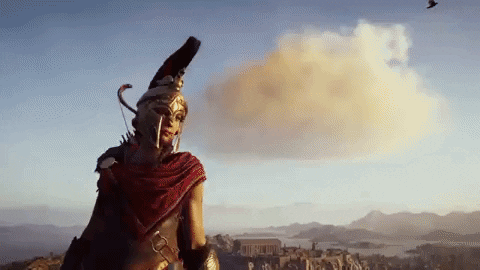
It's punk-o-clock again and today I wanna speak about that punkpunk genre, that might well be one of the most loosely defined: Sandalpunk. Really, trying to find something about this genre, I found that people do not agree about...
... if the genre at all is scifi, retrofuturist and/or fantasy and in how far
... what consistent themes of it should be
... what even the aesthetic is past "Ancient Rome/Greece"
... what kind of stories should be told in this genre
To put it differently: Sandalpunk right now is very much a title, but not a genre. Because there is absolutely no consistent anything within this "genre". But... I am gonna argue now, that it is kinda a waste, because there is a lot of potential there.
For those dipping into this blog for the fist time, let me quick go into the definition from Wikipedia on punk ideology, that I am going to use to assume that at least some of this should be present within a genre for it to be worthy of the punk-moniker:
[Punk Ideology] is primarily concerned with concepts such as mutual aid, against selling out, hierarchy, white supremacy, authoritarianism, anti-consumerism, anti-corporatism, anti-war, imperialism, conservatism, anti-globalization, gentrification, anti-racism, anti-sexism, class and classism, gender equality, racial equality, eugenics, animal rights, free-thought and non-conformity.
So, if I was trying to define Sandalpunk somehow, I would want to somehow bring that into it.
The other aspect the -punk genre have is, that they are somehow going into the scifi or fantasy genre, often doing a somewhat retrofuturist spin on things.
So, based on that we now have the three following ideas:
Based on the cultures of Ancient Rome and Ancient Greece
Anti-Hierarchical and Anti-Imperialist ideas
Retrofuturism, possibly with some fantasy elements
And I think we can actually get a working concept from this.
Because of course especially ancient Rome and to a lesser degree Ancient Greece were expansionist empires. Both cultures (though this is your scheduled reminder that due to the length of time these empires lasted the culture shifted) were very hierarchical, very classist and were very much about conformaty.
We still very much live in a Roman world, even though we usually do not think about it that way. But because of how Rome had colonized most of Europe before the Empire fell - and because of how it was Rome who went out and propagized Christianity, with the religion now inextricably linked with Roman culture to this day, being used to propagate Roman ideals to this day.
So, imagining a retrofuturist setting with Roman influence could actually mirror some real developments we see these days - just with less Christianity. And an added bonus is: The Romans already knew about steam power - they only in the real world had never figured out how to productively use it. (Mostly because slave labour was cheaper.)
And this could actually make for a super interesting set up for a genre.
Let me paint that picture for you:
It is 1300 AD, the Roman Empire has never fallen and has by now colonized all of Europe, with the exceptions of some parts in the far north, as well as most of North Africa and West Asia. The Roman Empire has since advanced their technology considerably, outmatching most of the rest of the world in technology. They have stern rules about the way people can and cannot live, their world being divided between the classes. However... There are some that do not want to accept the Roman rule, being willing to fight against it. Groups of people trying to keep alive their indigenous cultures, offering each other mutual aid, trying to survive under the thumb of the Empire.
I think there is a lot of potential there. Playing around with how the Roman Empire had influenced our world, making it more visible than it usually is. With a world that is familiar and yet isn't. The possibilities are endless. And of course we can have people rebelling against it.
And hey, maybe the Roman gods play a role in this world as well?
Right now Sandalpunk is not much more than a word. But that could be done with it. So... Maybe someone just gotta start writing this genre? For real, I mean. Rather than people just looking random things featuring mildly anarchronistic Roman things and go: "Oh! Sandalpunk!"
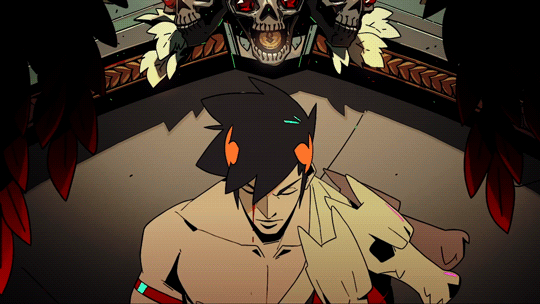
#cyberpunk#steampunk#sandalpunk#ancient rome#ancient greece#retrofuturism#science fiction#scifi#fantasy#alternate history
24 notes
·
View notes
Text
Obviously, I still have plenty more to watch, but the more it's sitting with me, the more I think "University" is the best episode of The Sopranos, at least so far. The below blurb from Vulture and this article from Refinery 29 sum up why pretty well for me.
The greatest of all Sopranos episodes as well as one of the hardest to watch, this is a level up from its inspiration, “College” (the similar titles cop to the connection). The A-plot is about Tony failing to nurture and protect a naive stripper named Tracee, who’s having an affair with the volatile gangster Ralph, a coked-out bully who ultimately murders her after finding out that she’s pregnant with his child. This horrifying story is juxtaposed with Meadow and her boyfriend Noah breaking up after Meadow’s roommate Caitlin comes between them—not sexually, but by making emotional demands that neither of them are willing or able to meet, and requiring a level of sensitivity to suffering that’s anathema to each of them. Both plotlines are about callousness and dehumanization, illustrating the sickening but very human tendency to decide that other people’s problems have nothing to do with you, then rationalize away the tragic result as a random cosmic dice roll. (In therapy later, Tony decries Tracee’s murder in vague, dissociated terms, changing her gender and calling it a “workplace accident.”) “University” is also an episode that indicts the misogynistic structure of the larger world as well as the insular tribe that is the Mob: Caitlin and Tracee’s stories are mirrors, though the level of physical degradation varies because one young woman is upper-middle class and the other dirt poor. Meadow serves as a rhetorical bridge between all the different moral and philosophical aspects of Terence Winter and Salvatore J. Stabile’s screenplay, variously reminding us of Tracee, Caitlin, Carmela, and Tony. The Kinks song “Living on a Thin Line” comments on the action, appearing three times on the soundtrack and establishing a link between the decay of the Mafia, England, Rome (via Ralphie’s Gladiator fixation), America, and patriarchy itself. The unifying image is the garbage-strewn sewer pipe behind the Bada Bing, reminding us this is a show about waste and wasted potential, and the roles that ideology, greed, and cruelty play in replicating it from one generation and one era to the next.
2 notes
·
View notes
Text
Kingdom Hearts Character's (Homestuck) Classpect Pt.1: I'm Not a Liar.
Howsitgoinguys I'm back with that thing I promised. I never forgot about it, it was just that some characters were so hard to classpect that for the sake of my sanity I had to step back from the project. But I'm back on my manic bullshit so not only did I get it done, but I have classpected every single character originally from Kingdom Hearts. Before I announce the first batch, I just want to be clear about my Classpecting system.
💋 I treat Classpecting as self contained like a horoscope or MBTI type thingy. But not as a personality thing; more like incorporating the story as a whole into the healthiest state of being for the character.
💋Because of above, I don't believe any Classpect is doomed to fail; it depends on the actions and events of the story and clashing with other classpects that lead down that path. Death can very well be part of the journey for a character but it shouldn't be the end; Foretellers yes, Dark Road no.
💋 My point of reference is literally what I remember from Homestuck itself, some notes from the Classpecting for Assholes by Neurotypeline video and the wiki HOWEVER I have also seen Optimistic Dualist's and Ouroborista's videos on the subject so if their influence it's felt... I just can't help it man, I don't have original thoughts.
💋 I believe in aspect duality; Breath-Blood, Time-Space, Hope-Rage, Doom-Life, Void-Light, Heart-Mind
💋 Breath/Blood is forward progression, Time/Space is foundation, Hope/Rage is symbolism and themes, Doom/Life is narrative, Void/Life is lore, Heart-Mind is character development. HOWEVER these categories aren't isolated. Characters can dip into adjacent concepts to help progress the main; the closest two inconsequentially and the ones further out with the possibility of an issue occuring.
💋 Characters are also linked to their mirror; sometimes in symbolism or their inclination to lean into it. Depending on the class and the context it can either be a nifty tool or super detrimental. In general even the most flexible classpect will go down a bad path if they lean more heavily into their mirror than their true Classpect.
💋 This is not a statement on powers or personality. Being the same Classpect as a cannon character doesn't mean shit I'm just dumb like that. The way I see it, your aspect is a collection of keywords, your class is the origin of your power/journey to getting it, and what the results of that are purely up to your imagination.
💋 Similar classpects will probably feel some type of way about them. Certain classes function the same way in a typically replicable way so they might relate on their journey. Certain aspects usually have keywords that correlate to ideological beliefs. They might also hate each other and be polar opposites because they interpret those keywords differently or they don't embrace/understand the journey of their class.
With that out of the way, there are a collection of types where there isn't enough content for me to do anything but vibe type them or...I dunno. I just don't have a lot to say about them. If your fave is on here, I'm sorry bestie. If you press me for your fave individually I will be happy to explain the reasoning but off the top of my head, I have nothing to say about these motherfuckers.
Hermod: Seer of Space
Vor: Mage of Blood
Urd: Thief of Void
Hoder: Heir of Life
Vidar: Witch of Mind
Vala: Sylph of Breath
Heimdall: Page of Blood
Helgi:Knight of Rage
Sigurn: Sylph of Heart
Odin:Mage of Time
Skuld: Maid of Breath
Ira: Prince of Light
Invi: Bard of Void
Aced: Knight of Life
Gula: Thief of Hope
Ava: Witch of Rage
Pence: Heir of Light
Olette: Maid of Blood
Larxene/Elrena: Prospit, Maid of Rage
Demyx: Prospit, Rogue of Void
Luxord: Prospit, Maid of Light
Vexen:/Even Derse, Seer of Light
Xaldin/Dillan: Derse, Prince of Heart
Lexaeus/Aeleus: Prospit, Knight of Life
Zexion/Ienzo: Prospit, Page of Space
DiZ: Mage of light
Caio for nao homies~
#kingdom hearts#classpect#kh diz#zexion#luxord#vexen#demyx#larxene#kh olette#kh pence#kh ava#kh gula#kh invi#kh aced#kh ira#kh skuld#khux#kh odin#kh sigrun#kh helgi#kh heimdall#kh vala#kh vidar#kh vor#lexaeus#xaldin#kh hoder#kh urd#kh hermod#kh dark road
5 notes
·
View notes
Text
An Inside Take A Look At Amber Sea Show Apartment Architecture

Once it pertains to property, among the absolute most crucial components that may bring in or even damage a sale is the show standard. It functions as the gateway for prospective shoppers to picture their future home within a development. Among the numerous show apartments that have actually captured the interest of residential or commercial property candidates, the Amber Sea show Flat stands apart with its own captivating design as well as design. Within this blog post, our experts explore in to a within take a look at the Amber Sea show Flat style, discovering its distinct functions and also the expertise it offers to site visitors.
Inside Take A Look At Amber Sea Show Apartment
Concept and Style Theory
The style of the Amber Sea show Flat is originated in a meticulous concept procedure that integrates each aesthetics and also capability. The concept ideology hinges on generating a room that not just interest the senses however additionally mirrors the way of living and also desires of its target viewers. Coming from the selection of materials to the design of each space, every aspect is thoroughly curated to evoke a sense of high-end and also convenience.
Spatial Planning and also Circulation
Among the standout components of the Amber Sea show Flat is its thoughtful spatial preparation and smooth circulation in between different regions. The designers have masterfully optimized the readily available space to generate a feeling of openness as well as expansiveness, in spite of the restrictions of a typical apartment design. Each room switches effectively into the following, creating an enlightening environment that urges expedition as well as interaction.
Combination of Organic Aspects

Nature participates in a crucial job in the design of the Amber Sea show Flat, along with a solid emphasis on incorporating natural environments in to the residing space. Large windows flooding the interiors along with organic lighting, while strategically placed greenery incorporates a touch of quality and vitality to the setting. Making use of lasting products even more improves the link to the atmosphere, generating a more eco-conscious lifestyle environment.
Signature Architectural Characteristics
Coming from rising ceilings to bespoke installations, the Amber Sea show Flat is actually accentuated along with signature building components that leave behind a long-term impression on visitors. Every information, whether it's the elaborately designed stairs or the claim lights components, offers to increase the general aesthetic appeal of the space. These distinct elements certainly not merely incorporate personality to the insides yet also exhibit the craftsmanship and interest to detail bought the layout.
Immersive Knowledge for Visitors
Past its own aesthetic charm, the Amber Sea show Flat gives guests an immersive knowledge that goes beyond standard show standard scenic tours. Involved screens, digital fact walkthroughs, and experimental areas permit potential buyers to completely immerse on their own in the lifestyle that the advancement assures. This hands-on technique certainly not just enriches the involvement level of visitors but additionally assists them envision themselves staying in the area, essentially influencing their getting selections.
Conclusion
In the reasonable globe of property, a properly designed show standard could be a game-changer for designers hoping to bring in potential purchasers. The Amber Sea show Flat sets itself apart with its own impressive design, well thought-out style, as well as immersive adventure for visitors. Coming from the concept stage to the combination of natural environments and trademark building features, every facet is meticulously crafted to generate a space that certainly not merely influences yet additionally resonates along with its target market. As a testimony to its results, the Amber Sea show Flat remains to mesmerize the creative imagination of residential property hunters, providing a glance in to the way of living of high-end and also complexity that waits for within the growth.
Amber Sea
+65 6100-6768
0 notes
Text
Finding The Malibu Hindu Temple In Calabasas And Its Rich Cultural Significance

Snuggled among the attractive landscape of Calabasas, the Malibu Hindu Temple stands as a testament to the architectural majesty and spiritual value inherent in Hindu culture.
Integrated in standard South Indian style, it is a personification of visual elegance and intricate workmanship that mirrors old holy place architecture from India.
The holy place complicated not only serves as a sacred place for Hindus but likewise mesmerizes individuals from diverse backgrounds with its impressive style and serene environment.
Moreover, this legendary habitation plays an important function in cultivating cultural diversity and approval within the area.
It functions as a melting pot where people regardless of their cultural or spiritual associations can gather together to appreciate the rich tapestry of Hindu traditions.
The Malibu Hindu Holy place thus transcends beyond being simply a place of worship; it symbolizes unity in diversity-- an ethos deeply embedded in American culture.
With each browse through, one is bound to experience a boosted feeling of belonging, further enhancing multiculturalism's crucial function fit societal characteristics.
Architectural Appeal of the Spiritual Website
Elaborately crafted and rich in symbolism, the building splendor of the Malibu Hindu Temple in Calabasas coincides with its profound spiritual significance, blending Indian customs with Californian affects.
The holy place, committed to Lord Venkateswara, a kind of the Hindu god Vishnu, is an epitome of South Indian design referred to as 'Dravidian' style. This significant framework makes up various complex makings and ornate pillars that hold aloft looming gopurams (temple towers), symbolizing a majesty similar to ancient holy places found in India. The white edifice exhibits a mood of tranquility and divine poise against the backdrop of Californian hillsides, growing an ambience favorable for self-contemplation and spiritual exploration.
The Architectural allure exists not just in its aesthetic appeal yet likewise its embodiment of cultural identity and religious ideology. Every information from the lavishly sculpted deities on outside wall surfaces to motifs embellishing internal sanctums serve as aesthetic narratives highlighting Hindu mythology and thoughtful principles.
As an example, one significant function is the 'Garbhagriha' or innermost sanctum where stays a consecrated image of Lord Venkateswara-- signifying the global spirit had within all beings. Additionally, this location holds occasions such as classical music concerts and dance performances which further improves its social values.
Therefore, with its masterful architecture intertwined with varied social aspects, Malibu Hindu Holy place supplies an immersive experience into Hinduism while promoting intercultural discussion among visitors from various histories-- creating a feeling of belonging with shared understanding.
Role in Fostering Multiculturalism and Approval
Exhibiting a sign of cultural diversity and approval, this sacred facility serves as a bridge that links different neighborhoods, promoting common regard and understanding amongst diverse histories.
The Malibu Hindu Temple in Calabasas has been instrumental in promoting an environment that welcomes everyone irrespective of their religion or ethnicity. It uses one-of-a-kind opportunities for non-Hindus to learn about the abundant traditions, personalizeds, rituals, and ideologies of Hinduism. This knowledge exchange helps with interfaith discussion and advertises a true admiration for cultural diversity.
The temple functions as greater than just a church; it is also a social hub where people from different profession come together to celebrate festivals, take part in yoga exercise courses, participate in community service activities or merely delight in the calm ambiance. For several people who have migrated from South Asia to America, the holy place supplies a sense of belonging by replicating facets of their homeland's society whilst facilitating their assimilation right into American culture.
The building grandeur evocative old Indian temples stimulates awe and admiration.
The melodic chanting throughout prayer sessions generates sensations of peace and spiritual upliftment.
Area events at the holy place foster sensations of unity amid diversity.
Involvement in typical Hindu rituals can prompt curiosity while enhancing cross-cultural understanding.
Observing sculptures illustrating Hindu divine beings might boost a recognition for artistic creativity rooted in faiths.
The Malibu Hindu Temple's function transcends beyond its religious value; it performs as an agent advertising multicultural coexistence within society. With its open doors plan welcoming all ethnicities coupled with its active involvement in local philanthropic events such as food drives and health and wellness clinics-- it reiterates the universal values installed within Hindu ideology: love, peace, consistency among all beings.
Its existence hence stands testament not just to the lively social tapestry woven by generations yet also adds another measurement towards nurturing worldwide citizens via education on resistance and acceptance towards different cultures.
1 note
·
View note
Text
The male gaze and its effect on female character design
Videogames design has always had issues when it came down to the variation to male to female ratio in the workplace. Due to the fact that the videogame industry is a male-dominated space and has been for many years. In the last couple of years, they have been trying to level out this due to an increase in issues of discrimination based on gender. A term that has been increasingly used is the male gaze originally theorized by Laura Mulvey. When you investigate the analytics of how female representation has been objectified and it comes down to female characters. What is the male gaze? The male gaze is a derivative of the way men objectify women. Masculine vision in this sense could be characterized as patriarchal, ideological fetishism. It's the issue of female spectatorship and seeing them as an object rather than a person. In this, I will be looking into how this could have affected the way female characters may have been designed. And how they've made sure this is not an issue in future design concepts in most recent games. (1)
Issue of sexism is not new female professionals in male dominated industry like the film industry has also been mirrored in the gaming industry it is linked that less female input on female characters can create a negative portrayal of them. when thinking of female character designs what are the most iconic ones you can identify. one I could name to be the most iconic female protagonist of its era is Laura croft. the 1996 character has been an on-going joke about her ample bust for years. Encouraged like a office joke and remained to be one of her most recognisable aspects until the remake was encouraged to focus on her story due to sexualisation of this character. In most recent years they have tried to use female characters as a main protagonist showing positive aspects of the gender, they may also have what is to be perceived to have male characteristics which could be argued is now in this centuries both genders aspects. Using a mutually moral thing in this case. However, they might have betrayed women as needing to be saved or being objectified.
Ece Canlı, Nicoletta Mandolini. (2022) Aesthetics in Distress: Gender-Based Violence and Visual Culture. Introductory Note. Vista:10, pages 2
www.proquest.com. (n.d.). Female video game characters and the male gaze - ProQuest. Available at: https://www.proquest.com/openview/535ae54f162387d6fa144115d27df884/1/index
Lynch, T., Tompkins, J.E., van Driel, I.I. and Fritz, N. (2016). Sexy, Strong, and Secondary: A Content Analysis of Female Characters in Video Games across 31 Years. Journal of Communication, 66(4), pp.564–584. doi:10.1111/jcom.12237.
0 notes
Text
Sword and Mirror - a Lacus Clyne Analysis
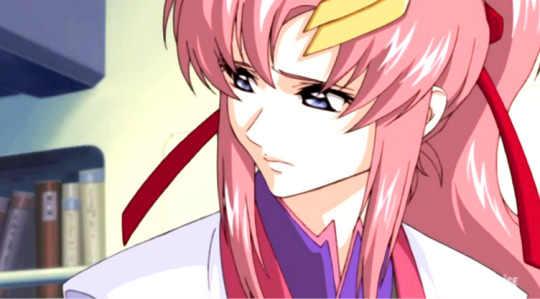
“First… decide. And then do it. It’s the only way to achieve anything.”
Do you want to read ~8.000 words of Lacus Clyne character analysis? I hope so, because that’s what I got for you today.
When I watched SEED, I was wholly convinced I would dislike Lacus and everything she stands for. I have never been more wrong. Lacus is a tricky character to grasp - the show narrates her story largely through themes, blank spaces and parallel storytelling. As a result, I understand how she can seem quite flat on a casual viewing. I promise you right now, there is more to her role in the story than meets the eye.
In a 2020 interview, Director Fukuda said: “I do remember [Writer Morosawa] saying that the idea of Lacus Clyne was that she would be a mirror of other people, and that was why she was necessary to reflect other people’s hearts.”
The primary mirrors for Lacus are Flay in SEED and the Durandal/Meer combo in Destiny, so these will be our focal angle for unraveling her character - because the question is not just “what does the mirror say about other people?” it is also “what is inherent to Lacus that is able to reflect these (often negative) characters so well?”
Lacus’ story includes a lot of interesting ideas about power, agency, and gender performativity. I am here today to make my case to all of you, to present to you the Lacus I came to love - a girl who would love to be ordinary, but who cannot ignore the ideological power her image has become entrenched with.
(Because tumblr is a functional website and won't show posts with links in tags, I will add my source links in a reblog.)
We’re going to be following Lacus’ appearances more or less chronologically here, with digressions into related topics when it fits thematically.
Starting us off, we can’t talk about Lacus’ early scenes without also talking about Flay Allster. Lacus and Flay are two sides of the same coin and the show beats us over the head with that pretty much from the first time we meet Lacus.

Flay and Lacus arriving on the Archangel follows the exact same script: a girl exits a lifeboat, floating through the hangar, into Kira who blushes at the proximity and informs her that this is an Earth Forces vessel. The two scenes are merely four episodes apart, serving as a giant blinking billboard to tell the viewer: compare and contrast these two!!
At this stage of their lives, Lacus and Flay are in nearly identical situations. Their mothers are out of the picture, having passed when they were young. Their fathers are important politicians of their respective faction. Each of them is engaged to a boy they did not choose as part of a ploy to further their fathers’ political agenda.
That is hitting right on a theme SEED explores with most of its main cast - children as extensions of their parent’s will. As they exist at this early stage of the story, Lacus and Flay are each tools to further their fathers’ reach. The fact that both of them seem to have positive emotional relationships with their fathers does not diminish this aspect - in fact, I’d argue it underlines it. Both of them want to live up to their fathers’ legacies and willingly accept their place in it.
This means that there is a level of performativity that permeates every aspect of their lives. We see this most clearly with Flay - every part of her day to day persona is carefully curated to show herself as a perfect little lady. We know that this act is directly linked to pleasing her father, because it includes doing things for her father’s benefit such as writing love letters to Sai despite not actually liking him or putting in unusual effort to look her best for reuniting with her dad. She acts out the perfect hyperfeminine daughter that George Allster wants to present to the world. Flay’s sweetness is a manipulation - a way to exert power, first on her father’s and then on her own behalf. This is why Flay keeps up the performance, even once we have seen the real Flay as a much darker personality. It’s the only way she’s been taught to assert agency and thus her only strategy to protect herself.
Lacus is rather similar about strategically using her hyperfeminine charm when needed be. Her initial episodes on the Archangel serve as a perfect example of this.
But first, we have to elaborate on her background. She’s a popular idol singer on the PLANTs but her career is, like everything else, something that is tailor-made to promote her father’s moderate politics. When Meer describes Lacus’ job in Destiny, she does it like this: “[Her job] is to actively pursue ways to help the PLANTs and the world achieve peace.” Tellingly, the line is placed over an image of Lacus and her father.
So we know that Lacus is politically active by this point, even if just as her father’s mouthpiece. We also know she is in this sector of space as part of a ceremonial delegation. She is literally engaged to Athrun in a bid to reign in Patrick Zala’s extremism by making the public see the Clyne and Zala families as a unity. What I am getting at is that there is absolutely no way Lacus is oblivious to the context she finds herself in when she boards an Earth Forces ship. When she acts as though she were, it’s deliberate.
Lacus only takes decisive action when she feels that she knows all the facts and she likes to go see the circumstances of a situation for herself. This is something we’ll talk about a lot more later on, but it is already useful to keep in mind here.
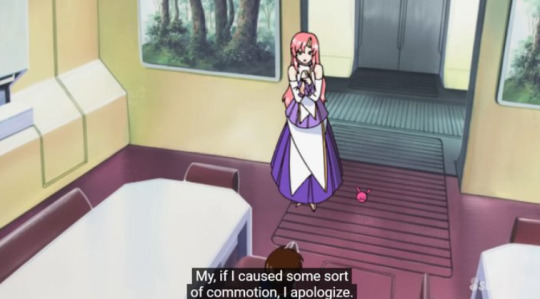
Lacus’ time on the Archangel is characterized by her leaving her (locked) room again and again to wander the ship, then acting oblivious as to why anybody would be upset about the enemy leader’s daughter freely scoping out the place.

(Her mild ‘Oh?’ here always gets me.) It’s the kind of behavior she can get away with precisely because she is a hyperfeminine teenage girl - if she were an adult male refugee instead, she might have been arrested for pulling a stunt like that. But being as she is, the exaggerated naivety somehow registers as believable for everyone on the ship and she gets off scott-free.
What I love about Lacus and Flay is the level of awareness they both have about gender being a performance that can be put on for gain. Both of them are genuinely pretty girly, but more than that they know how to play up the girliness and use it to exploit gender biases to their advantage. They know people are likely to underestimate them and/or be sweet on them and they bank on it fairly often.
Of course this isn’t to say Lacus’ personality is one big fake and there is a ‘real Lacus’ in there who is diametrically opposed to how she presents herself. Even during the Archangel stay, we see Lacus in private and we find a gentle girl. She prays, she sings, she plays silly little games with her Haro. Lacus’ naive act is effective precisely because it is merely a slight over-acting of her regular self.
This is confirmed by Director Fukuda when he states that “about half of her behavior is natural, but she can also play the role of herself. She is her true self when she confronts Rau Le Creuset and she is also her true self when she plays with Haro.”
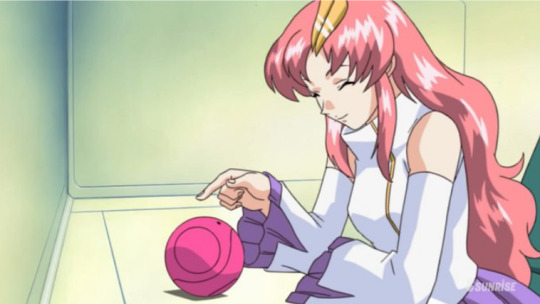
While we’re on the topic of Haro, I find pink Haro to be a bit of a curiosity. In Gundam’s history as a franchise, Haros have usually represented something about their owner. For Amuro, Kamille, Hathaway and Uso their Haros were manifestations of the childhood they were clinging to / that was clinging to them.
Lacus’ pink Haro is the first Haro in Gundam to be willful and rude instead of cheerful and supportive (though Haro in Victory certainly packs a punch). It also has the rather interesting catchphrase: “I won’t accept that”. What does that say about Lacus, if anything?
I would argue that it is a first pointer towards the strength of personality and opinion that Lacus camouflages behind her innocent exterior. During these early episodes, there are two major hints towards the Haro symbolism.
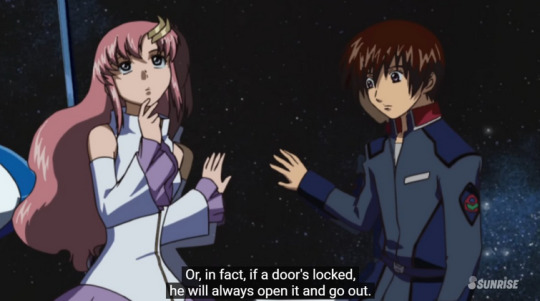
The first is simple: Haro is Lacus’ excuse for constantly leaving her room. See, it is Haro who won’t allow them to be locked in. This is totally out of her innocent public persona’s control, see?!
The second one follows when Lacus leaves the Archangel and we first see proof positive that she’s been playing dumb while in enemy territory. As soon as Lacus is safe in Athrun’s suit, she addresses Rau in a commanding tone never heard before.
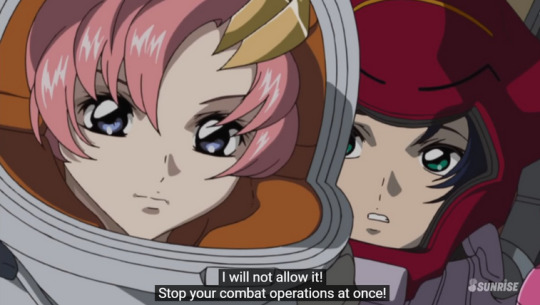
“Stop it at once. Are you trying to turn this location into a battlefield when there is a representative of the memorial delegation here? I will not allow it! Stop your combat operations at once!”
Suddenly, we learn that Lacus has perfect awareness of her own importance and a clear grasp on political/military speech style. We are forced to recontextualize the clueless girl we’ve spent the last few episodes with, turning our perception of the character on its head. But the viewer isn’t the only person shocked by this. As Athrun stares at his gentle fiancée in bewilderment, we are treated to Haro’s shout of “I won’t accept that! I won’t accept that!” which perfectly echoes Lacus’ speech and feelings - meanwhile Lacus herself just gives an angelic smile, acting as though she has no idea why what she just did should be astounding in the first place:
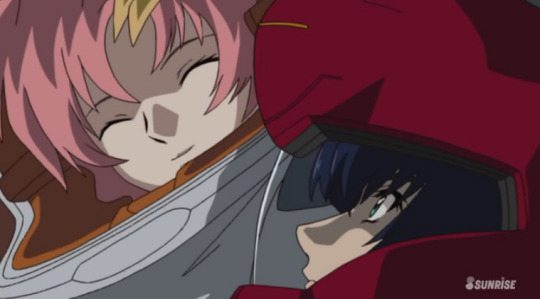
The disparity between Haro-as-the-inner-voice and Lacus’ outer performance as she reverts to her usual ‘public self’ is used deliberately, foreshadowing the many surprises Lacus still has up her sleeve.
Lacus is then moved to the ZAFT vessel Vesalius, where she continues to wander about against Athrun’s advice. Though she is no longer in enemy territory, it makes sense for Lacus to keep up the naive act so she can scope out the ship as much as possible. After all, she sees herself as a civilian who wants to end the war. She has no specific loyalty to ZAFT as a military. Of course she’d want a glimpse at things.
After this, Lacus is shuffled out of the plot for a good bit as she recuperates at her home with her many, many Haros. So many Haros. It will never cease being funny that Athrun (notedly, the person who gave her the Haros) is also the one who goes ‘how can you live like this?!’.
This is a good opportunity to talk about Lacus and Athrun’s relationship as a whole. Though the two of them never met before being introduced to each other for the engagement, they like each other. Lacus seems dedicated to making this marriage work out. In a bonus audio drama covering their first meeting, Lacus basically steamrolls Athrun with her can-do-attitude regarding the engagement. He is completely taken aback as she speculates about the hair color of their future children… Lacus approaches the engagement on a baseline of ‘I don’t know you that well yet, so I don’t know if this is good or bad - might as well be optimistic.’ It’s only after Athrun’s enduring discomfort that she slows down. This ongoing positive approach to the relationship seems to both be because of her dedication to her father’s cause as well as because she simply comes to like Athrun. She treasures his gifts, is overjoyed when he comes to visit, and would be perfectly willing to take their relationship to an actual romantic level.

Just look at her waiting for a proper kiss before Athrun chickens out and opts for her cheek instead…
But ultimately, Athrun just does not understand Lacus. This is evident in their interactions and confirmed several times by Director Fukuda. Athrun can’t see past Lacus’ one-sided public presentation. Her deeper thoughts and convictions are lost on him. According to the above-linked interviews, it is this specific visit in episode 20 when Lacus tries to test Athrun and then decides to cut her losses.
“I think she was trying to see if Athrun could accept her thoughts. Lacus also feels that way about Kira, so she told Athrun that she likes him. She actually wanted Athrun to inquire about her reasons, but Athrun doesn’t ask. That’s why Lacus can’t make space in her heart for him.” - Fukuda, as linked above.
Not only does Athrun not seem open to meeting her head-on ideologically, he also doesn’t display any jealousy at her stating she is fond of another guy. Both as a comrade and as a romantic partner, Athrun feels distant from Lacus. Of course she remains fond of him as a person, but she won’t keep chasing a connection he is not emotionally open to.
Kira is different in this regard - he is ready to accept and agree with Lacus’ morals, to let her take Flay’s place as the person who inspires him to keep fighting. And that is precisely the next step in Lacus’ journey - forging her bond with Kira.
After Kira and Athrun gravely wound each other in battle, Reverend Malchio picks up the injured Kira and brings him to the PLANTs. It is implied though not elaborated upon that Malchio is part of Siegel Clyne’s large web of contacts trying to stop Patrick Zala’s megalomania. Malchio and Lacus appear to get along well - it stands to reason that Kira was entrusted to her care because Malchio knew he’d saved her before.
Lacus delights in nursing Kira back to health. She shares her love of the outdoors and beautiful gardens with him, and listens to his struggles and regrets. It is here that we get a good glimpse at the way Lacus’ genuine girly side looks. She is playful yet ladylike, she can appear quite innocent… but she never seems at a loss for what’s going on and routinely gets serious when discussing matters of war and trauma.
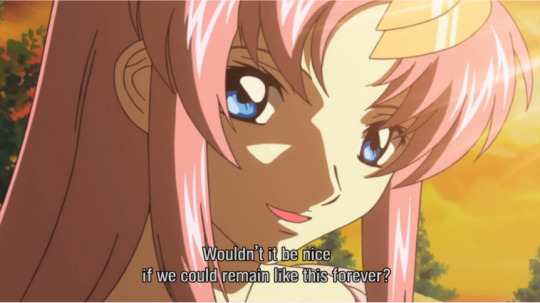
This Lacus in the garden is the person she would like to be. In her ideal world, there would be peace and she’d be at liberty to simply enjoy her songs and flowers, spending time with a person she likes. Lacus’ gentleness and her appreciation of simple pleasures are not an act.
Unfortunately, that ideal world does not exist. Which is why, when Kira declares he wants to fight not ZAFT nor the Earth Forces but the conflict itself, Lacus sees her own morals echoed in him and decides to act as well.
She abuses her authority and the trust the PLANTs’ society holds in her in order to let Kira steal the Freedom, one of ZAFT’s new super weapons. It is likely that she was aware of the Freedom’s existence through her father - there don’t appear to be any secrets between the two of them.

This is a good point to point out one of Lacus’ most defining habits: her tendency to ask questions. Though she is far from clueless, she is someone who will contribute to a conversation by prompting for elaboration again and again. She knows that asking someone else to spell out their thought process will help them solidify it.
Lacus has a very intuitive understanding of the human mind and how to enable it. She is a good person and mostly uses that strategy in order to gently nudge those who are already morally aligned with her in the right direction… but there certainly is potential to use this kind of strategy for outright manipulation. We will see as much when we get to Destiny… but I’m getting ahead of myself.
Right now, allowing Kira to act has also forced Lacus to do the same - she is now regarded as a traitor to the PLANTs for her theft of military equipment and needs to go into hiding. There is only one last thing she feels she needs to do before she can address the public: tie up loose ends with Athrun.
The staging of this confrontation reveals Lacus’ deep sentimentality. She hides out at the theater she first sang in publicly, a hideout so fitting of her personality that Athrun figures it out with only minimal prodding. Lacus had taken great care of the flowers she received from that theater years ago. I’d say it’s fair to assume that the location has not just been picked for how easily Athrun could find it - after all, Lacus is singing in full stage costume when he finds her. In a way, this is her goodbye performance to her old life that she is now giving up in the name of rebellion.
On this stage of memories, Lacus gives Athrun an ultimatum.
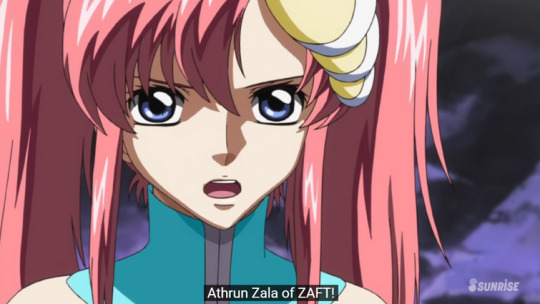
“Did you kill him? What is it that you believe in and fight for? Is it the medal you received? Your father’s orders? If it is, then Kira may once again become your enemy. And so will I. If you’ve declared me an enemy, will you shoot me? Athrun Zala of ZAFT!”
For the first time, she addresses him with a harsh voice and allows him to see the full power of her determination. (Poor guy, he had no idea what he was in for…)
At this point everything has been set in motion and Lacus is fed-up with Athrun’s lukewarm commitment. He is holding her at gunpoint, but the one forcing a decision is Lacus. When Athrun protects her from the ZAFT agents sent to kill her, that proves that Athrun is not acting in blind loyalty to his father - he passes Lacus’ test. Noteworthy is that through this entire exchange, Lacus had gunmen from the Clyne-faction in hiding. If Athrun had actually made a move to hurt her, he would not have left that theater alive. I fully believe that Lacus would have ordered his death if it ensured that he won’t get a second shot at killing Kira - the sword she is pinning all her hopes on. However, she surely had confidence it would not get that far. Her primary intention was to wake Athrun up, not to get rid of him.
With this last personal matter settled, Lacus begins her real work. She has the unique advantage of being an already established ambassador for peace through her idol work (and the association thereof with her father’s politics). This gives her inherent credibility with the populace of the PLANTs - something she is intending to make full use of through guerilla radio broadcasts.
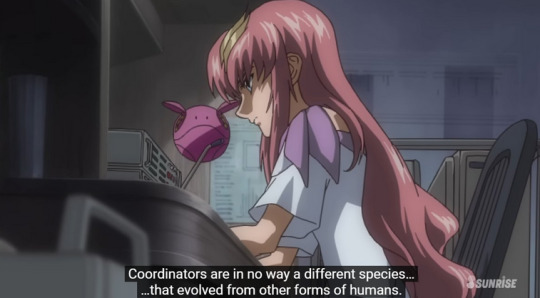
“Coordinators are in no way a different species that evolved from other forms of humans. Even with the reform of marriage regulations, we are unable to build towards our future. How is that an advanced species?”
In her speeches, she takes a stark counterposition to Patrick Zala’s doctrine of Coordinator superiority. Fukuda repeatedly calls Lacus a radical girl - and for her context, she is. After all, she lives in a society legally controlled by eugenics, in which only marriages resulting in childbirth are legally viable. To stand up and publicly declare that the entire premise of the current PLANTs is bullshit… That is bold.
Her rebellion is harshly punished as her father is mercilessly gunned down for association with his daughter - which now leaves Lacus in charge of the whole Clyne faction. Her response to her father’s death is muted. She merely nods in acknowledgement and goes back to organizing her resistance force - the only hint to her true discontent is once again Haro, closing out the scene with an “I won’t accept this!”. We see yet again that Lacus’ public face is always tightly controlled. As a leader she understands that she cannot show weakness or risk hurting the morale of her group.
Through the connections her father established and the loyalty of her own followers, Lacus manages to steal the spaceship Eternal and escape from the PLANTs. Through this, she can reconvene with the Archangel and meet both Kira and Athrun again.

It is here that Lacus allows herself to cry about her father for the very first time. She is a girl who is open with very few people, who does not feel like her position offers her the luxury of being candid with her emotions. It takes being alone with somebody she trusts for her to let go and truly feel.
I am going to be talking about Lacus’ relationship to Kira in more depth when we get to the beginning of Destiny, but for now it will suffice to say that their non-faction-aligned positions make them kindred spirits who rely on each other. They have gotten to know one another fairly well during Kira’s sickbed stay at the Clyne mansion. Kira has met Lacus with an emotional openness that Athrun never showed her, which makes it easier for her to fully respond in kind.
(As an aside, the death of the politician father is a recurring theme in SEED. Lacus once more follows in the footsteps of Flay, as well as Cagalli; with Athrun soon to join them.)
During the battle sequences following the reunion, we see Lacus as a collected and capable commander of her ship. We have already witnessed her incredible calm (not losing her cool when threatened, losing family members, having people shot in front of her,…) and it comes in handy here as well. Notably, Lacus is shown to be a lot more cold and pragmatic than Athrun. Where Athrun is motivated by personal relationships and would risk it all to save their comrades who are lost in the Mendel colony, Lacus immediately declines his plan.

“Even if Kira, Mu and Dearka never return, we must still continue to fight.”
Just like Lacus has accepted the death of her father, she would also accept Kira’s death in the name of a greater cause. As always, her personal feelings take a backseat to being able to fulfill her function and represent her ideology.
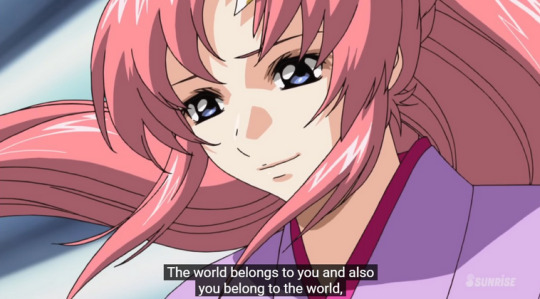
“My mother told me something long ago. The world belongs to you and also you belong to the world, as long as you are born and exist in this world.”
This attitude is at least somewhat contextualized by this quote that shows up shortly after. Lacus’ mother is implied to have passed away when she was very young, possibly making this one of Lacus’ core memories of her. “And also you belong to the world,” seems to encompass a lot of Lacus’ attitude towards duty and commitment to peace.
Lacus’ arc in the season closes off with the activation of her SEED mode, as well as the associated speech. I have transcribed it in full here:
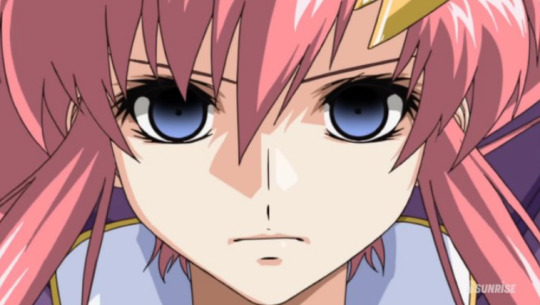
“We humans, possibly, could exist without fighting. However, many of us choose to fight. For what reason? To protect something? Protect what? Ourselves? The future? If we must kill to protect our future and ourselves… What sort of future is it? What are we? There is no future for those who have been killed. And what about those who have killed? Is happiness to be found in a future that is grasped with bloodstained hands? Well, is it?”
In The Art and Data of Gundam SEED, this scene is described as follows: “Confronted by so many lives being lost, Lacus’ SEED activates out of grief and sorrow over the endless link between humanity and war.”
However, what I actually want to point out is not what triggers her SEED but how her SEED manifests. Usually SEED mode is shown to enhance piloting skill, but Lacus isn’t a pilot. What she does instead is the one thing she does so well: ask questions. Her power is the unerring dedication to bring into question things that are seen as self-explanatory, to inquire again and again if there truly is good reason for the world to be this way.
It positions her as the perfect antithesis to Rau who views violence as a given and himself as the answer.
In SEED, the series villain is Lacus’ opposite, a clear-cut opposition. It is in Destiny that Lacus really comes under scrutiny with a villain who is far more alike to her in many ways.
But before we can get into discussing Lacus and Durandal, we have to cover the After-Phase Between The Stars short, a five minute special that serves as a bridge between the first and second season, catching us up to what the cast has been up to in the two year time skip.
The set-up for Destiny often comes under scrutiny because fans consider it uncharacteristic for Lacus and Kira to have pulled back from politics rather than take part in managing the peace they helped bring about. I don’t think that is true. Neither Kira nor Lacus wanted to be in a position of authority, nor do they feel like they actually have adequate answers to the complex political problems of the Cosmic Era. During the war they had a clear goal, but the reparations are not nearly as simple.
The two of them are only 16 when the war ends - it’s natural that they would want to back out and leave the rebuilding efforts to qualified adults. For them to move to Orb and live with Malchio so they can heal from the loss they’ve endured is an understandable choice.
And it is not as though Lacus makes this decision out of pure selfishness and thoughtlessness, as After-Phase spells out almost word by word.
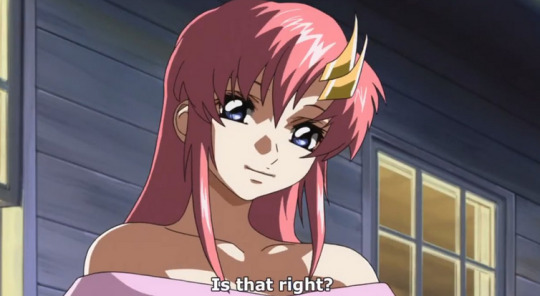
Cagalli: “It’s amazing you actually went out onto the battlefield. Doing that suits you well.” Lacus: “Is that right? But even when Kira was crying, he still said he would return. We may still not understand what we should be doing. The world isn’t something that someone creates.”
Lacus is aware that she has amassed a lot of influence over the course of the war, being an idol turned resistance leader whom the people generally rely on. If she were to step up now, people would be sure to place undue importance on her just because of the feelings they project onto their role. That is a power she doesn’t want to use.
Not doing politics at this juncture is her political stance. She feels the world should be shaped by people and not by ideologues making the decisions for them.
Cagalli and Lacus are at different ends of the same problem during Destiny - where Cagalli tries to step up to her position of power and finds the complexities of it quickly overwhelming her, Lacus decides stepping away is what is best for the world and is mistaken in that as well.
Lacus’ decision turns into a major part of Destiny’s conflict - because Lacus is not the only one who sees that her position holds inherent power. Durandal sees it too, and he exploits the vacancy by filling it with his own propaganda version of Lacus. In Meer, Durandal creates the Lacus that Lacus herself doesn’t want to become.
This is where full analysis necessitates a digression to Durandal, who is Lacus’ true counterpart in this season even as Meer takes the role in physical appearance.
Lacus’ mirror being split between Meer (body) and Durandal (mind) is interesting in itself, because it touches on a gendered dimension again. Durandal states that Lacus’ power to influence is greater than his own, but that is not due to who she is as a person. The influence of “Lacus” can only be realized because she is a beautiful young girl. We find ourselves at an intersection of idol culture and propaganda - Lacus as an idol is by-design a ‘pure’ celebrity, someone you can look up to without concerns because they are wholly innocent. That is how idols are produced in the real world as well. Through stepping out of the ‘idol’ space and becoming a resistance leader against an inarguable evil, Lacus has then attained an almost goddess-like reputation. The trust inspired by superficial elements like her beauty and soft voice are conflated with her achievements at the end of the war. She is venerated as the icon of peace, rather than seen as an individual with the capacity for flaws. “Lacus” is a near-abstract concept to the public.
That’s what makes it so easy to abuse - so long as you have another beautiful young girl at the ready who is willing to play into the idea of “Lacus, the beautiful savior”. And boy, does Meer play into it. She takes Lacus’ distanced image and turns it on its head. By delivering fanservice like no tomorrow she plays further into the idea of Lacus as a consumable savior who exists for the sake of the audience, whipping the crowd into a frenzy. A large part of Lacus’ influence is thus divorced from who either she or Meer is as an individual.
However, Meer doesn’t write her own speeches. Durandal controls everything she says. Where Meer mirrors the way Lacus is seen (and not seen) by the public, Durandal is the one we truly need to examine here.
First things first. Durandal is absolutely intended as a Lacus parallel. This is conveyed at a number of points through the season, but the first overt comparison is made when Durandal giving Athrun the Saviour is written and shot in an almost 1:1 recreation of the scene in which Lacus gives Kira the Freedom.
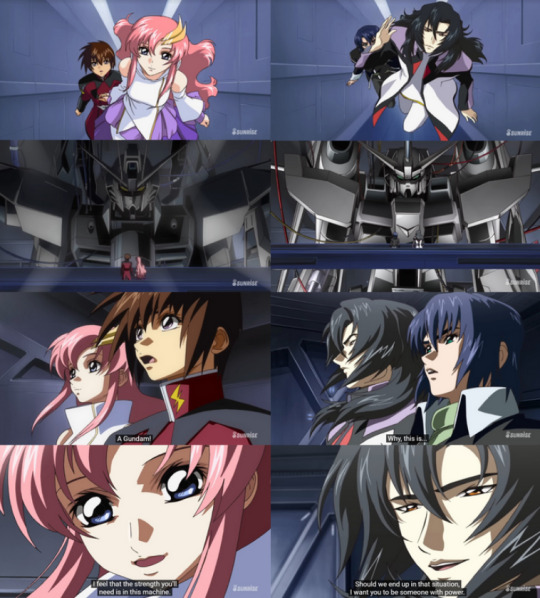
Lacus: “I feel that the strength you’ll need is in this machine.” Durandal: “Should we end up in that situation, I want you to be someone with power.”
Lacus: “Will this take you where you wish to go? Will it help you when you get there?” Durandal: “But what you can do and what you wish to do… These are things that nobody knows better than yourself.”
Even Lacus’ “I am Lacus Clyne, you are Kira Yamato” is echoed in the way Durandal insists on Athrun’s inherent self and nature. The idea of an inherent self, a core of a person, is something that unites Lacus and Durandal. They just take it in very different directions - Lacus’ point of view is a more standard “be true to yourself so you can love yourself and find your true purpose”, while Durandal takes it a big step further and comes out on the other end with “have someone decode exactly What You Are and then adhere to it for the rest of your life instead of ever questioning. This will make you happy”.
Durandal is Lacus taken to the extreme. Every soft line of wishing for a world in which the cycle of war is forever broken is turned into a masterplan and a doctrine.
Further, Durandal and Lacus’ strategies of dealing with people are similar, to the point where we have Athrun explicitly picking up on it. The Lacus-giving-Kira-the-Freedom vs Durandal-giving-Athrun-the-Saviour sequences are completed later in the season when Lacus gives Athrun the Justice. We’ll address this scene ahead of time here because it is more important for establishing the Lacus-Durandal dichotomy than it is for Lacus’ personal growth.
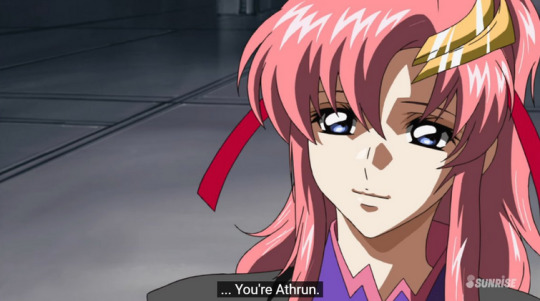
Athrun: “Are you trying to tell me I’m nothing but a soldier?” Lacus: “That too is something for you to decide. Power is nothing more than power. And perhaps you are a soldier, but over and above that… You’re Athrun. That’s all there is to it.”
This exchange a) follows Athrun’s realization that Durandal thinks of him as someone who is destined 0nly to be a soldier and b) is accompanied by Athrun directly flashbacking to his conversation with Durandal, comparing that with what Lacus is saying.
Both of them are in the process of prompting him to pilot a mobile suit they already had manufactured for him. Both of them employ a similar rhetoric of making a plea to his intrinsic self and allowing him a choice. Both of them are successful at making him get into the robot.
Lacus and Durandal differ primarily in two core aspects. For one, Durandal prioritizes the role over the individual. I.e.: ‘Athrun is Athrun and because he is Athrun, he can only ever be a soldier’. For Lacus, the inescapable self is the core of your personality, but what you do with it is up to you. I.e.: ‘Athrun is Athrun and thus he has to make the choice that goes best with his true heart’.
The second difference is how genuine they are. Both Lacus and Durandal understand how to manipulate people, but only Durandal abuses this manipulation constantly and with great intentionality. Lacus generally tries to hold back and only encourage instead of exert control. Durandal will lie, Lacus less so.
But in the end both of them remain as people dedicated to their ideal of peace, who employ a soft surface personality in order to make others let their guard down.
Destiny is a season about deconstructing Lacus The Idol. Durandal zeroes in on Lacus not simply because of who she is but because of the ideals she’s grown to represent, the thing she was marketed as from the start, everything that was projected onto her. Lacus The Idol is a construct, an ideal, a wish. Durandal is trying to turn his interpretation of that wish into reality. Lacus The Person is nothing but a roadblock to him.
Though Lacus does not have as many scenes in Destiny as she does in SEED, she is even more crucial to the framework of the story this time. This also means that what few scenes she does get tend to really matter for fleshing out her character.
Her journey begins when Durandal’s failed assassination attempt causes Kira to once again become a Gundam pilot. Lacus is incredibly hesitant about this, but Kira reassures her that he’s fine and doing this out of his own will.

And with that it is finally time to dive into Lacus and Kira’s relationship properly.
Let’s preface this with a Fukuda quote from The Art and Data of Gundam SEED: “Their hearts are connected, but they aren’t like lovers. In a sense, they’ve skipped over that step and become something more like family. Kira is afraid of losing Lacus, because of his trauma with Flay. And Lacus feels guilty for making Kira do something he didn’t want to do, so she feels indebted to him. Psychologically speaking, the two of them are in a rather precarious codependent relationship.”
If the dynamic between Lacus and Kira reads as awkward, it’s because it should. In the beginning of Destiny, Kira is portrayed as traumatized by his encounter with Rau, which he has several flashbacks to. Lacus is the one accompanying him through his recovery, but she is also extremely aware that she is the one who gave him the weapon to fight Rau, that she is the one who is responsible for Kira entering the war again.
Lacus needs Kira to fight and enables Kira to fight, but she knows this is a horrible thing to do to somebody. And she can’t apologize for it, because if necessary she would do it to him again. That is the kind of pragmatist she is. Her feelings towards Kira remain as “I am fully aware that I intentionally put you in this situation, both materially and emotionally, and I know that I can never make it up to you”. How deeply and sincerely sorry she nevertheless is ties her to Kira more than anything else in the world. She cannot make it up to him, but she will spend a lifetime trying. Her feelings of guilt are on full display several times throughout Destiny.
Kira meanwhile projects Flay onto Lacus. His failure to protect Flay translates into an obsessive need to protect Lacus instead. Flay shapes every aspect of how Kira interacts with Lacus, how he can interact with Lacus. No doubt the topic of sexuality is also deeply tainted by his highly charged experiences with Flay.

Lacus does have some romantic feelings for Kira, seen in her blush when she kisses his cheek after giving him the Freedom or in the way she cares about his opinion when she is trying on a variety of outfits during Destiny. But she also seems respectful of the fact that Kira cannot truly reciprocate. (He also absolutely fails at having any opinions about Lacus in different clothes - it is bittersweet to see that short attempt at acting like a proper couple fail so miserably.)
The most romantic affection we see between the two of them are kisses on the cheek and I think it’s fairly safe to say that that is all there ever is.
Lacus and Kira cling to one another, silently asking for a forgiveness they can never be granted. They are nominally a couple, but the reality is simply that much more complex. They are family, they help each other heal, they make each other sad, and they absolutely cannot be apart.
The ghost of Flay hangs over them both in-character and narratively. Lacus has become the reluctant wielder of the sword that is Kira Yamato, the sword Flay helped forge. In turn, Lacus assumes Flay’s position in Kira’s mind; as the driving force, the one giving him direction, the woman to be protected.
Returning to the plot of Destiny, Lacus is now on the run with the Archangel, forced to watch as Meer assumes her identity. Fans generally seem to think she doesn't mind this, but that’s not really true. Lacus is just never vocal about her feelings.
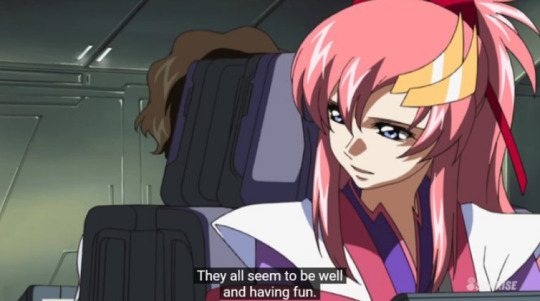
Rie Tanaka’s line read in this scene of everyone watching Meer’s concert is absolutely superb - Lacus sounds deeply sarcastic. The Art and Data of Gundam SEED just confirms this when describing Lacus as “with a smile on her face, but daggers in her eyes.”
Lacus is deeply bothered by what is being done in her name and to her image, but currently neither has the means nor the strategy to combat it. She’s in hiding because she is under active threat of assassination and also because they just don’t really know what is going on.
The latter is of particular importance, because Lacus’ MO remains as it always was: she wants to know as much as she can about a conflict before acting. This principle is actually spelled out in her bath scene with Cagalli.
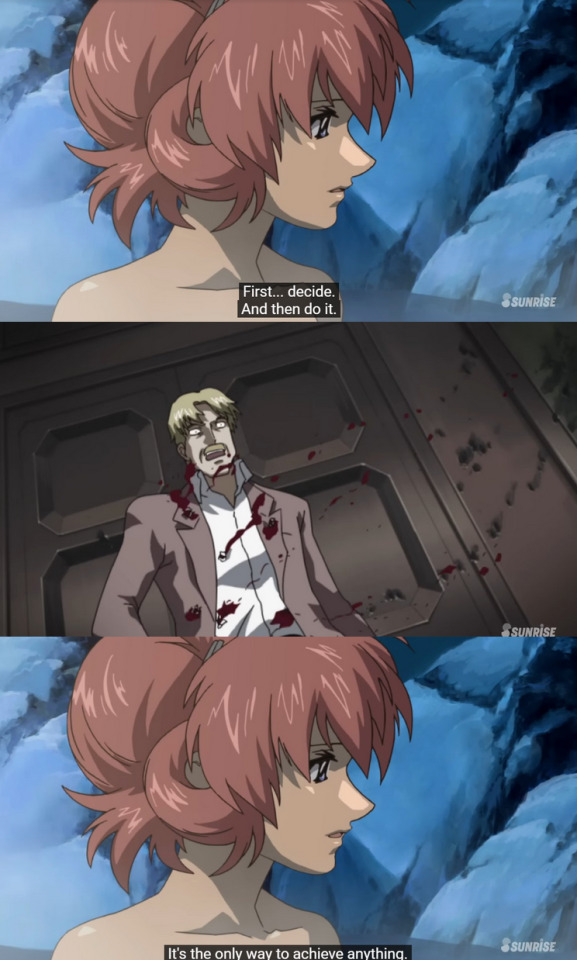
“First… decide. And then do it. It’s the only way to achieve anything.”
What seems simple nevertheless delivers a good glimpse into her interiority, especially thanks to the inclusion of a flashback to her father’s death. “Guilt” is a core theme for Lacus this season. Destiny presents a Lacus who is fully aware of the tragic consequences of her actions, a Lacus who carries that sadness permanently.
“It’s the only way to achieve anything,” is what she says, but she also means: “If you allow yourself regret, if you allow yourself to contemplate all the different paths you could have taken, you will surely be crushed by it.”
Lacus' philosophy is founded on standing firm in her decisions. She cannot allow herself to be immobilized by regret.
And that is another part of why Lacus takes so long to act. She observes situations very carefully until she is completely certain of the route she wants to take - of the route that will leave her with the least regrets.
Her unwillingness to act unless certain is Lacus' greatest strength and greatest weakness in one.
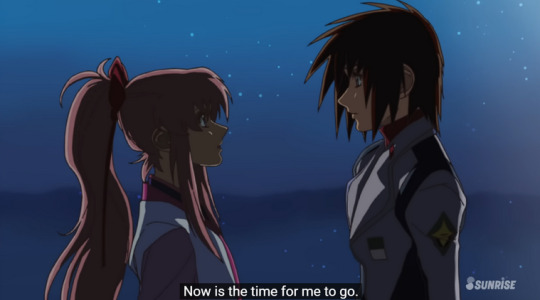
Thus Lacus soon admits that she does not know the best course of action. She then decides to act on her principles and go look at the situation on the PLANTs for herself. It’s a mirror of the viewing deck scene Lacus and Kira share at the very beginning of SEED. That encounter ended with Kira smuggling Lacus out of the ship, this one ends with her leaving by her own choice.

Though Kira worries about Lacus, she calms him down by quoting back his own reassurance when he first stepped back into the Gundam. This puts a nice emphasis on the mutuality of their relationship. Just as Lacus understands that Kira does not wish to be a pilot, Kira understands that Lacus longs to live a regular life far away from political importance. They both want nothing more for each other than a peaceful situation in which they can escape that which burdens them.
Lacus’ plan for going back into space is to impersonate Meer and steal her shuttle, a nice bit of vindictiveness on her part. There is a fun little audio drama in which she pretends to be worried people appreciate Meer more than her, tricking Waldfelt into helping her learn Meer’s dance routine. In truth, that was preparation for this exact plan. It goes to demonstrate that Lacus not showing her full cards and instead acting out the carefree girl she would like to be is a constant habit for her.
Thus Lacus sets out for the PLANTs, investigates Mendel colony, and finds out that Durandal is on the fast lane to upgrading society to Eugenics+. Interesting here is the revelation that Lacus has kept the Eternal in hiding this entire time and maintained a crew. Though she was hoping that the world would straighten itself out, she clearly never ever abandoned her backup plans for the worst case scenario. She is cautious in every sense of the word.
Meanwhile Durandal is rapidly trying to unify all of mankind under his leadership, attacking the independent Orb under pretenses of only desiring to root out Logos. So Lacus decides she has seen and heard enough. She needs to reveal herself before it is too late.
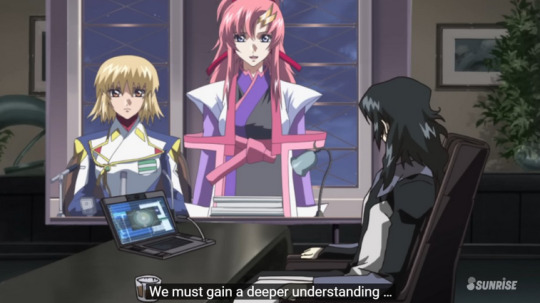
“I ask the world, please do not get caught up in the trap of his words, telling you that no one else is at fault. We must gain a deeper understanding of Chairman Durandal’s true objective.”
Even though Logos is undoubtedly a powerful evil within the Destiny universe, Lacus calls out the faults of conspiracy thinking and encourages people to question the motives of anyone who offers a solution that is too easy and too clean. It’s Destiny’s clumsy attempt of exploring the thin line between calling out harmful power structures vs simplifying reality in order to create a unified enemy.
It is also interesting because Lacus’ plea for everyone to think for themselves and question the absolutes presented to them is at odds with what a large portion of the public wants from her. They would like for Lacus The Idol to guide them - which is exactly why Meer was so effective as a propaganda stunt. The nature of Lacus’ social power is by default opposed to the change she actually wants to effect in the world.
This then brings us straight to Lacus’ actual confrontation with Meer.
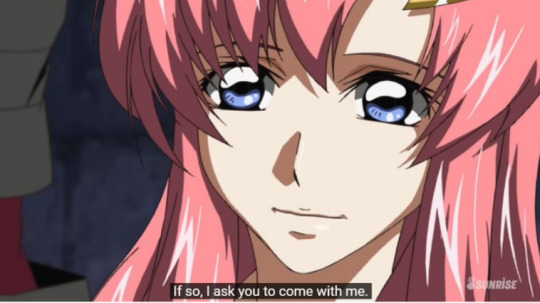
Meer lays a trap relying on Lacus’ goodness and dedication to helping those in need. Ignoring the trap would prove Lacus a hypocrite, but Lacus is not the type anyway. She walks into the trap with open eyes - and offers Meer a sincere chance to be saved.
That’s the thing about Lacus and Meer: Lacus hates that the identity theft is happening, but she does not consider Meer to be the main perpetrator. Rather, Meer is also a victim. Lacus’ speech to her demonstrates this well and also says a lot about Lacus, so I’ll be copying it down in full:
”If it’s my name you want, you may have it. And my appearance. You and I will still be different people. That will never change. None of us can be anything other than ourselves. But that’s why you and I exist and stand here before each other, right? That’s why we have encounters, right? With one another and also ourselves. Your dreams belong to you. So please sing your dreams for your own sake. You mustn’t let others use your dreams for their benefit.”
Lacus looks at Meer and she feels sad as well as responsible. Meer was coerced to throw her own life away in the name of Lacus The Idol. Lacus feels that what happened to Meer could only happen because she exists. She sees a girl trying to become a version of her that Lacus herself feels is a burden, and she can’t help but be sad for the consequences of her existence.
I said before that “guilt” is a big theme for Lacus in Destiny, and here it appears in its more misguided form, taking more onto her shoulders than is actually warranted. One might argue it is a form of arrogance in its own way.
However, Meer and Lacus never get to resolve this. Meer steals Lacus’ place one final time, taking a bullet meant for her and dying in her stead. The sense of guilt is thus solidified and will remain with Lacus for the rest of her life.
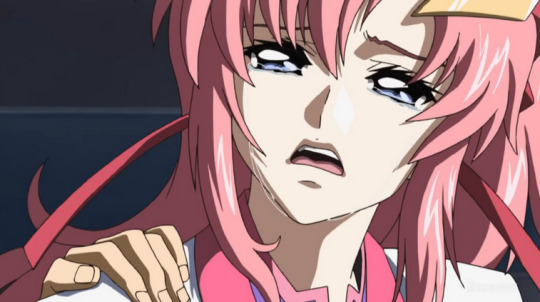
Lacus’ tears for Meer are the most intense expression of grief we see from Lacus in the whole series and I think it is fitting.
Meer was a girl who spent much of her life wondering about Lacus, wishing she could know about the elusive stranger behind the idol. Now Meer is the one who is an eternal stranger and Lacus is left wishing she could hold onto more of her than just the diary and the idol work she left behind.
To Lacus, Meer is a girl who destroyed herself out of admiration for her. A girl who was consumed because Lacus’ inaction let it happen. Lacus’ philosophy might be largely pacifist, but it is not and has not ever been victimless.
And that is what really makes Lacus’ character to me: this awareness that even her best bet at a ‘correct’ decision is not the bloodless path, cannot be the bloodless path. Adhering to her morals still costs lives and Lacus tries to confront that dilemma, carrying her grief close to her heart.
Lacus’ speech to Meer conveys what Lacus thinks of life, touching both on her core similarity to Durandal (the idea of a ‘true self’) as well as the most major difference: Lacus believes striving for dreams to be the inherent value of human existence, even if it causes pain. Just as her decisions are worth making, even if they result in loss.
“All lives are meant to fight for a desired future,” is the bottom line Lacus arrived at by the end of Destiny. The right to struggle towards your dreams is worth fighting for, the contradiction of mankind is lamentable but ultimately to be protected.
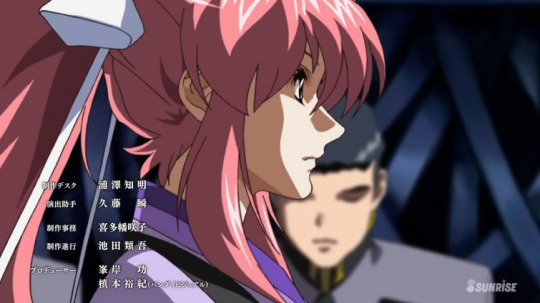
And after the war ends, Lacus has internalized the responsibility she feels for what Durandal wrought. Though she does not want to hold political power, though she wishes she could simply play in her garden for the rest of her life, she realizes now that even her absence can be instrumentalized for harm. By the end of Destiny, Lacus has been locked into her very own bad ending, the exact thing she tried to avoid.
She closes the season where Cagalli begins it, stepping up to the inherent responsibility of having power. It is an intriguing place to leave her. It will require her to step out of the idol image that she has acquired, and to make decisions before she is ready to make them. Both the public and Lacus herself will have to reckon with Lacus’ fallible nature as an individual. The ethereal image of Lacus as the beacon of morality might well be crushed under the weight of Chairwoman Clyne.
Lacus is a reluctant mastermind. A girl with great talent for affecting others, always wishing for a world in which she does not have to use that talent.
Now she is following in the footsteps of a man who was a manifest representation of what a well-intentioned villain she herself could easily become - and she can only hope she’ll make decisions that she can stand by, just as she always has.
#gundam#gundam seed#lacus clyne#flay allster#gilbert durandal#bc i talk a good bit about both of them too#analysis
287 notes
·
View notes
Text
SKAM ESPANA- The characterisation/villainization of Kasim

The choices of episode 4 of Skam Espana has caused another polarising reaction, some people feel frustrated and annoyed at some of the actions of some characters, whilst others feel insulted and upset about the lost potential of the show with Kasim and others. I've seen many comments insulting the writing of the shows villainising some of the characters and just overall dropping the show for the decision to make Kasim's storyline replace the Even/Mikael storyline. These reactions are the reason I've decided to break down the choice the writers made when going with this storyline and why it shows excellent understanding and writing of the message of Season 4. Also you can check out my previous post on the choices of these writers and why it’s brilliant to make Dani Yousef here:

THE MESSAGE OF SKAM
When people choose to watch the Skam universe, it still confuses me about the reactions of surprise or anger when the show tells the story. So before I break down the character dynamics of Isak and Kasim and how they're mirror characters/shadow characters. I want to focus on the meaning of Skam.
Skam in Noweirgian is shame. Basically, the insecurities that surround this generation's teens as they grow up with perspectives embedded by societal norms. The topics discussed usually revolve around self-discovery and how these insecurities/fear affect the chosen character in a world that disagrees with how they want to express themselves. We've had alienation, depression and self actualisation with stigma from cheating, we've had topics of feminism vs sexualisation, violence and prejudice and stigma of being a sexual harassment victim, we've had conversations on LGBT, internalised homophobia vs the stigma of having a mental disorder, and lastly, we've had religion, culture and race vs the stigma of feeling cultural dissociation on some of the rules/agreements within these aspects.
Each character in Skam goes through the arc where they make mistakes due to their perceived skam; they hurt, use, or judge because of their own opinions and perspectives on the issue and they realise that they are hypocritical or also wrong when they fall in love with someone who represents a foil to their own insecurity. The need to be with their romantic interests is what catalyses them to make drastic decisions and finally gain self actualisation, but it also ends up having a hopeful outcome, that with love and treating people equally and right, that these insecurities can be overcome and everyone can be who they want to be. It's what made this show so relatable, reliable and also crucial for our generation youths. It's what made this incredibly written; humans who make mistakes and learn and grow from it whilst also causing the audience to think introspectively about their own skam and their own journey to self actualisation and self-love.
It makes no sense why people go into this show expecting perfect characters who make no flaws or see things wrongly and make decisions on those wrong perspectives. It makes no sense why people feel so triggered when they know what the skam of the character is. They know that at first, it won't be represented correctly because the show is in our main character's perspective, they need to learn about their flawed views on their skam and overcome it. It's only until the ending; the issues of the show are resolved. So why are people so triggered when scenes show the reality of the world and these characters ? Especially when we're just in episode 4? It makes no sense to me.
So this is why I want to talk about the Villanisation of Kasim and what the writers want to achieve with this character.
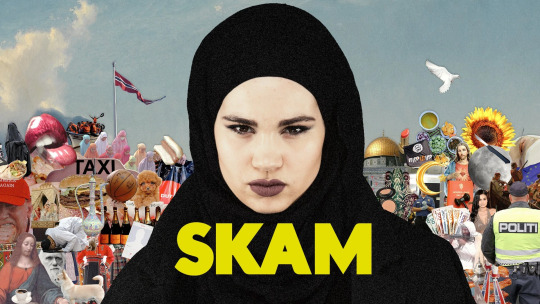
SKAM SEASON 4: DISCUSSING THE EFFECTS OF RELIGION AND INTERNALISED HOMOPHOBIA ON THE YOUTH
In Season 4 of OG Skam (Based on Amira's counterpart Sana), one of the main storylines interweaving with her questioning how people view her religion is connected with her brother, his friends and her new friendship with Isak. (the main character of season 3). The mystery surrounding how the relationship of Isak's boyfriend was damaged with Sana's brother's friendship group and her and her love interests perspectives on how religion played a part of it, culminates into a fight between the two worlds when Sana's brother punches Isak. This leads to Islamaphobic comments from people who like Sana judged her brother on his religion, and it's the stereotypical link to homophobia. As the story unveils the truth is that due to fear and perspective of religion plus internalised homophobia, Even (Isak's boyfriend) was hurt when he kissed Mikael. He ran away after that leaving both his friends confused and also some (Yousef) having a new perspective on the rules of religion. At the end of the season Even reunites with the group, and Sana realises that she also had adopted the mindset of the world when it comes to her religion and learns to communicate and trust that people aren't against her faith and beliefs. Her skam mostly throughout the season is her guilt for her religion and conviction's perceived laws/opinions. So how does this link to Skam Espana and its own message towards this topic?

SKAM ESPANA: KASIM BECOMES ISAK
This storyline is explored in Skam Espana by putting its Sana, Amira even more affected and connected to the source of the message. Amira's best friend brother Kasim going through his own internalised homophobia and flawed perspectives of religion (Just like Mikael and Even in OG), uses Amira as a way to run away from his skam. However Amira's own beliefs on the truth and the fact that she has a different love interest ends up causing her best friend to misunderstand her as someone who is using her brother and is going against her true beliefs/faith (Basically going against her culture and religion for a white guy) - From this already you can see the topics of Skam S4 already showing up here, the same flawed perspectives/ guilt of religion is placed on Kasim, the outcomes of religion and internalised homophobia actually affects Amira more because it's affecting her own reputation as an excellent Muslim friend, and the questions of being torn between two worlds stem from the fact that Amira is in love with her other best friend's brother who represents the non-religious aspect in her life, vs the world wanting her and Kasim (another brother of her best friend) to be together which connects the religious part of her life. Stay with me.
In a way Kasim's storyline connects to other characters as well; He represents Isak's internalised homophobia journey in OG S3 when he met Even (Kasim is in love with Lucas), he represents Elias (Sana's brother) dissociation from his culture and his pressure to be a good Muslim older brother, he presents Yousef as well because of his perspectives on religion and LGBT, he also represents even Sana for his own skam, which is his religion and feeling torn between two worlds/ideologies as he falls for someone who is not of his race and beliefs.
But this is what's so brilliant about this choice, he's POC character who is a representation of a POC Muslim Gay character, with his own skam, and is written with depth, and characterisation and is also given a leading role in this season. This decision to write him this way does not villanise him but actually makes the audience pay attention to him and learn from him like any other skam main characters. He's important and human, and he's a well-written character. That's why it makes no sense to me why people think Skam Espana is villainising and not representing this message well. But let's continue breaking down this character:

Kasim as Isak: The journey of a LGBT’s self actualisation whilst dealing with internalised homophobia
In season 3 of OG Skam, and also towards the end of the first season, we see a story of Isak as he deals with coming out to his peers and accepting his sexuality. Isak makes many mistakes from the first season because of his internalised homophobia. He breaks up the relationship of his best friend and girlfriend (due to jealousy and feelings for the guy), he ends up running away from his problems and enters fake relationships with girls using them as beards. He also later forms a relationship with Emma as he falls in love with Even. See the similarities with Kasim, when we watch Isak's season? We feel for him because we understand the choices he makes whilst wrong is a human thing to do, especially dealing with his skam, and we cheer for him as we watch him overcome all this to choose Even. By the end of his journey Isak is proudly gay, in love and happy. And he has become one of the most loved characters in Skam due to his relatability and message he represents.
Kasim is the same, he makes mistakes hurts the ones he loves because of his internalised homophobia, he lies and hides behind other people especially Amira who's been dragged into it as his beard (even though she hates lying and is in love with someone else) and he manipulates situations to keep on avoiding his skam. He's doing precisely what Isak did; he's being a normal teenage LGBT boy going through coming out and dealing with internalised homophobia. For him, the pressure is the same as Isak. Isak also deals with religion as a barrier in his season (he perceives his mum and Sana at first as homophobic, he also feels pressure in coming out to his friends and he lies to his loved ones about Even for a bit as well.)
Kasim's own issues stem from the fact that he's also religious, even more, pressured to follow his traditions and culture figureheads the 'figure head' of his household now his father is dead, and so has a lot expected from him by many people in his family. It makes sense why he's going through what he's going through and even though it's not right since we see the outcomes of his skam on others like Amira, we understand why he does what he does. In the end, you guys are watching an Isak season told from the perspective of an Emma/Sarah (his beards) in this season. Emma being Amira in this case despite not actually having feelings for Kasim. In the end of the day, Isak was not a villain, just a teenage boy who makes mistakes, Skam Espana has done the same for Kasim.

Kasim as Elias: The journey of a POC's self-acceptance whilst dealing with the pressure of Cultural expectations and tradition
In Season 4 of Skam OG, we look at Elias Sana's brother. At first, he seems to get away from the constraints of religious expectations because Sana thinks he does, (she thinks he gets away with more stuff because he's a man) and yes this might seem so. Still, we do see that Elias is also going through pressure, it causes him to drink and act out, and when he speaks to Sana, later on, he admits he also feels in the middle of religion and what he wants to do as a teenage boy. This is also explored more in Skam France Season 4, Elias's mirror character is shown to be seen as a failure due to not meeting the expectations of his parents and also is quite secretive about what he does outside of the household like date a racist for example. (yes that was a snide remark but it had to be made.)
But what I'm trying to say is Kasim is also based on this character, first from Amira's perspective we see how he can get away with following religious and cultural expectations by hiding who he really is, and by acting out secretly still keeping his reputation intact. But also from his own admittance and Dounia's (his sister and Amira's best friend) perspective on the character. We can see that he's under a lot of pressure to be perfect for people. Dounia especially looks up to him and is so grateful for his presence in her life when their dad died, she replaces him as the father figure in her life who can do no wrong, and he's expected to uphold religious and traditional beliefs of his household because he's the main figurehead. It's incredibly stressful, so he acts out, he lies about Lucas which Lucas hates, and he uses ways to manipulate situations like using Amira (a perfect beard to make him look macho and 'right')
Kasim becomes the Elias representative but with more depth, more focus and more characterisation. Skam Espana has actually given a new POC more priority than his counter representatives, he's actually more than just a brother to one of the characters, he's just like a main character with his own self-acceptance journey, and that's incredible for this writing team.

Kasim as Yousef: The journey of a Muslim POC's self discovery whilst dealing with stereotypical perspectives of religion
Yousef is the love interest in OG Skam. He is the reason for why Sana has to overcome her own prejudices, and skam and learn to love her self. He's also the connection to her torn between two worlds dilemma that she goes through with her arc. Kasim starts off as a perceived Yousef by the audience; he's perceived as a perfect POC, Muslim and love interest. But like Yousef, Kasim has his own flaws, his overall close-minded perspective on religion is similar to how Yousef's own opinion to the religion is, instead of actually still wanting to embrace his self as a Muslim, Yousef removes himself from everything to do with it (we could argue this since he does always follow the values of behaviour and morals), but he does seem negatively biased against religion even though he falls in love with someone who is very religious.
I'm not saying Yousef is wrong in his opinions, I see him like every other character human with his views and his own beliefs, and that's great. But Kasim is an exploration of that close-minded perspective on how religion divides people, how religion is discriminatory and closeminded. Kasim chooses to do what he does because of his own opinions on religion; he never really thinks there's a hope that religion doesn't have to be an issue in his life. It makes sense, but as we see from other characters in the show, religious perspectives do not mean entirely close-minded, homophobic or discriminatory opinions, in fact, Amira is the accurate representation of what religious people are like nowadays, a love for the traditions, and rules which every Sana has a speech about this opinion on religion and homophobia in Isak's season, religion should not be an excuse for treating someone awfully etc., Amira and Sana show that you can be openminded, can agree with love is love despite customary laws from ages ago saying it's wrong. It's about the person's own character, not the religion its self. But this is why I love this addition of this character mostly because he causes conversations like this, about the message of the show, the flawed perspectives of society on religion and the moral dilemma it faces with how people treat this topic.
It's not making religion a problem. Actually the opposite it's only Kasim's point of view that there is no other option if he comes out as Muslim LGBT, but no one else on the show has agreed or shown evidence that his perspective is correct. Like Isak, he will learn that with love and hope there are parts of the world that are religious that will love him for him, and that part will include his sister. So again Kasim isn't being used a device to villanise or stereotype religious perspectives, its the opposite it's to teach about that issue. So also this show is brilliantly smart with how they used this character despite it seeming like it's not the right choice.

Kasim as Sana: The journey of a teenager towards self love whilst dealing with insecurities and romantic idealisation vs reality
Lastly, because I think I've tried to make my point clear in this essay. But Kasim is also representing Sana, as I said before in Skam falling in love with a foil of their insecurities makes the main character typically to act out, make mistakes and then learn about their hypocrisy and flawed perspectives and grow. They realise that they are loved and appreciated for who they are. And they come to love themselves fully by the end of the show. Kasim has fallen in love with Lucas, and like Sana, he goes through the angst and questioning of what this means to fall for someone who represents the opposite of what she believes, he acts out by lying and manipulating (miscommunication is also a device used in Skam especially by Sana). He messes up and learns from his mistakes.
Sana's choices in season 4 of OG makes her hurt people, she hurts her friends, her love interest and also Isak as well because of her skam, but she learns that her perspectives on the issue are wrong. Kasim will learn that lesson because Amira is the person he's hurt and is affecting, he might get punched before that (still think Dani or someone will do this because it causes that message of being torn between two worlds to be genuinely explored) but he will learn and grow.
And that's why his character, making him a brown POC who does what he does, is not to villainise race, or culture or religion, but actually to make him just as crucial as Sana in her season. He's just like the main character in Skam. So this season actually has two POC Muslim prominent roles that really delves deeply into the question of religion, love, homosexuality, culture and race both stories just as in-depth as the other, both lessons just as essential and truly relatable and needed in our society.
And for that I can't help but commend these writers, Skam Espana truly is an excellent remake of Skam it takes all of the messages and just goes more in-depth, it brings those questions to the surface in a right way, whilst teaching its own audience about their own insecurities and flawed perspectives. And to be honest, that is just incredible.

123 notes
·
View notes
Text
I Only Hold Convictions
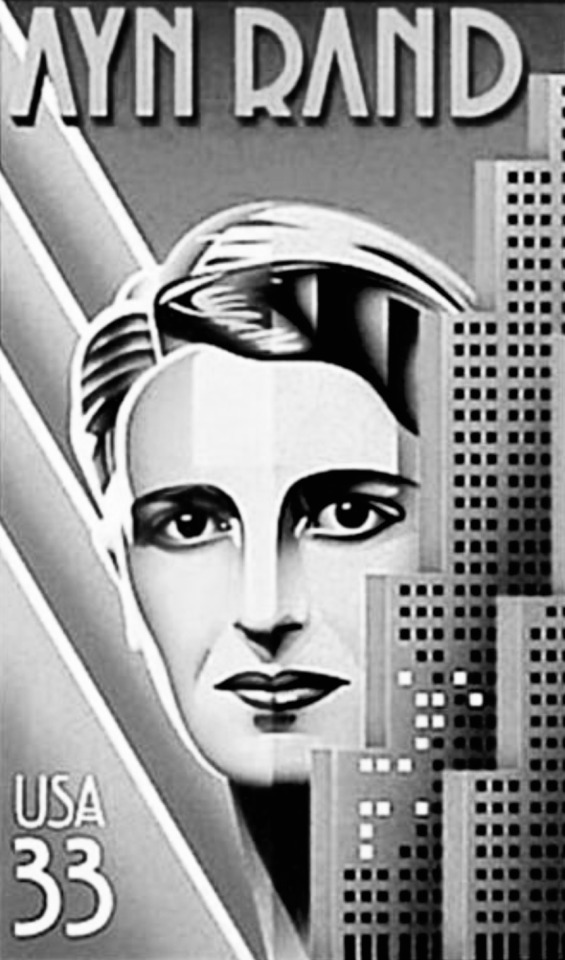
There is no preface that quite reflects my conflict here. I am no lover of Ayn Rand, either literally or symbolically, and yet there are aspects of her that cannot – I’d even hazard must not – be discarded wholesale or, indeed, be denied. By her own admission in The Romantic Manifesto, she writes:
“The fact that one agrees or disagrees with an artist’s philosophy is irrelevant to an esthetic appraisal of his work qua art.”
It would also be somewhat naive to dismiss in its entirety Rand’s contribution to modern rational thought or the central tenets of Objectivism as it stands in relation to processes of logic and the pursuit of our own happiness. Flawed as her belief system is overall, there is – as with any text – worth in the exploration. Rand continues:
“One does not have to agree with an artist (nor even enjoy him) in order to evaluate his work. In essence, an objective evaluation requires that one identifies the artist’s theme, the abstract meaning of his work (exclusively by identifying the evidence contained in the work and allowing no other, outside considerations), then evaluate the means by which he conveys it— i.e., taking his theme as criterion, evaluate the purely esthetic elements of the work, the technical mastery (or lack of it) with which he projects (or fails to project) his view of life.”
When it comes to Rand, problematic is most often the “view” readers step away with. From her axiomatic starting point of “existence exists” through to the gravely cynical conclusion where selfishness is deemed high virtue, altruism despicable vice and capitalism the only sane socio-economic model, she adheres strictly – and indulgently – to categorical dichotomies; the black/white and either/or thinking characteristic of young minds yet to encounter the complexities of nuance. Technical weakness is almost by the by; the cumbersome surface of the prose insignificant when we consider the allegorical and anagogical deficits. Further distaste might also be attributed to the fact, especially with regard to Atlas Shrugged, that this is very much by the writer’s design.
But to close our eyes and wish away the horror? The text becomes no less potent in its ostracised state. Indeed, it could be argued that exclusionary approaches amplify meanings – often ones that were but an unsavoury blip before controversy sauntered in. And for us, too, we must beware. “An artist reveals his naked soul in his work,” Rand writes, “—and so do you, gentle reader, when you respond to it.”
Which, perhaps, goes some way towards explaining why I’m taking this discomforting trip through the literary wilderness, light years or so from my natural habitat. And political persuasions aside – and I would wholly endorse this when in pursuit of a truly critical reading – Rand deserves to be part of the current cultural conversation, not least of all because she does ignite the argument and all of its unresolved facets.
And I’m going to say it: Rand isn’t all bad. You have to study beyond a cursory glance and set aside the less palatable veins of pathological self-interest that pervade much of her oeuvre. However, to cast her in a soulless light would be an erroneous misrepresentation of a woman who also expressed that “love and art” are not merely a “special province” of our existence but, in every way, our “sense of life.”
So it is to love I turn, love that Rand defines as inextricably linked to character. As she explains in The Virtue of Selfishness:
“To love is to value. Only a rationally selfish man, a man of self-esteem, is capable of love—because he is the only man capable of holding firm, consistent, uncompromising, unbetrayed values. The man who does not value himself, cannot value anything or anyone.”
Not, then, love as “sacrifice” but more as noble desire – dignified and discerning. Five years earlier, in a 1959 interview with Mike Wallace, she says:
“Because when you are asked to love everybody indiscriminately. That is to love people without any standard. To love them regardless of whether they have any value or virtue, you are asked to love nobody.”
She describes an impetus to choose, to give affection based on mutual respect, a regard of self in relation to other:
“You love people, not for what you do for them, or what they do for you. You love them for their values, their virtues. You don't love causes. You don't love everybody... You love only those who deserve it. Man has free will. If a man wants love he should correct his flaws, and he may deserve it. But he cannot expect the unearned.”
I’m not here to posit that Rand is faultless in her appraisal of romantic love, but she offers something concrete, something – dare I say – honourable from yesterday to consider today. Not the blanket philosophy nor, in her own words, any “faith.” But a mature alternative that acknowledges not just how we devote ourselves to each other, but why.
As Rand offers in her 1964 Playboy interview:
“[Selfless love] would have to mean that you derive no personal pleasure or happiness from the company and the existence of the person you love, and that you are motivated only by self-sacrificial pity for that person’s need of you. I don’t have to point out to you that no one would be flattered by, nor would accept, a concept of that kind. Love is not self-sacrifice, but the most profound assertion of your own needs and values. It is for your own happiness that you need the person you love, and that is the greatest compliment, the greatest tribute you can pay to that person.”
And on that note, I must concede that Rand might be right – for love is not indifference. Nor is it, for me, simply a matter of material pleasure. If I return to Atlas Shrugged, there is resonance albeit in the brevity of places I had to work hard to find. But nonetheless, if intimacy “forces [a man] to stand naked in spirit,” I may also feel the same, relinquish myself to “the sum of [my] fundamental convictions.” Rand writes:
“[A man] will always be attracted to the woman who reflects his deepest vision of himself, the woman whose surrender permits him to experience... a sense of self-esteem. The man who is proudly certain of his own value, will want the highest type of woman he can find, the woman he admires, the strongest, the hardest to conquer — because only the possession of a heroine will give him the sense of an achievement.”
Over sixty years since its publication, the rampant anti-feminism may be forgiven in part. But my point is not in the ideological line; it is to return to the truth of art, of life. Though it isn’t meant to work both ways, it does. The reading is mine, and I love – sometimes in the darkest of Rand’s “metaphysical” mirrors.
#writing#quote#women writers#love#life#perspective#meaning#existential musings#all eternal things#love in a time of...#intelligence quotients#depth perception#understanding beyond thought#literary sensibilities#art matters#underneath it all#elisa english#elisaenglish
2 notes
·
View notes
Text
I’ve Never Seen David Lynch and George Lucas in the Same Room at the Same Time…
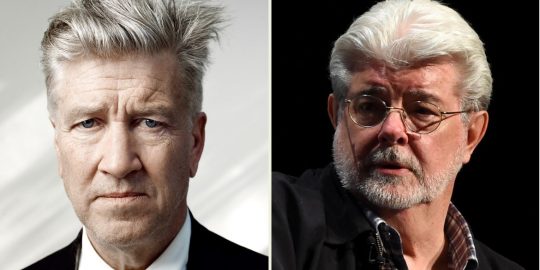
The thematic parallels between David Lynch and George Lucas are something I keep coming back to again and again, but their careers and evolution have a lot of overlap too. They were born in the earliest Boomer cohort (George Lucas in May 1944, David Lynch January 1946) and had experiences growing up that were colored by the idyllic 1950s, but shifted into a distrust of authority structures that was common for many of their age cohort in the 1960s. They both came of age wanting to do something physical with her hands that felt creative to them in large grimy spaces - fixing cars for Lucas, and painting and installations with a fascination with organic materials, industrial metal, and rot for Lynch. They both fell into film because they were looking for something that satisfied their artistic bent (although film was never a primary aspect of her life to that point). They wound up making a handful of short films over a 3 year period, culminating in a longer short-film that would eventually get them noticed at roughly the same age (Electric Labyrinth THX 1138 4EB [1967] and the Grandmother [1970] for Lynch).
These films netted both of them a patron (Francis Ford Coppola for Lucas, the American Film Institute for Lynch) and started filming their first feature-length film two years after those films. They both got their biggest name recognition bump by films released in 1977 and pulled away from the power of the studio system in roughly 1984. Famously, Lucas offered Lynch a chance to direct what would become Return of the Jedi in about 1981 ( I prefer the story where Lucas does this by picking him up in a Lamborghini - I’ve heard a phone call version too, but it’s not as perfect) and Lynch answered something like “it’s your movie George, you direct it.” They both spent the mid 80s in movie jail, and although they took very different paths in general after (I’ve been emphasizing the similarities) there are still things that jibe in the history - they both reminded people of what they liked about them with a late 80s movie, spent a lot of the 90s on TV projects, did one project around classic radio, returned to theatrical notice around the millennium, all the while generally keeping their own council and disappointing a lot of fans.
There’s obviously a world of difference. Lucas is a left brained technologist who equated freedom with an owning of the means of production. Lynch is it right brained impressionist seeing freedom-as no one ever being able to tell you what to do, acting as a solo artist with collaborators who merge with his sensibilities. Lynch is a production lone wolf, depending mostly on people believing in him and funding him, and losing out in the popular consciousness by making uncompromising art that may not be what the audience wants, meaning funding is sometimes hard to come by. Lucas is like the Democratic party controlling the Congress and presidency - having total power but unable to turn that into what he really wants to make, somehow. The idea of Lynch selling his body of work to Disney is absurd.
But the correspondences in this are telling and help to explain the thematic similarities and divergences. Plus, the differences often relate to the similarities - Lucas identifies with corrupted controlling paternalistic power as a horror of inevitable capture of the individual by larger structures, while Lynch sees the corrupted masculine influence as an archetype, the call coming from inside the house, agency coopted by a collective taint in the universal pattern . But on some level these are the same thing - what is this person I am capable of becoming seeing as I am in control but yet not, doing horrific things? Lucas’ constant commentary on slavery is about hegemony and a systemic oppression he is complicit in, while Lynch has whole pantheons of beings that turn people into vessels that oblate the self and make them act on subconscious programming. Neither probably think the word neoliberalism too much but tend to communicate similar things about it is almost diametrically opposed ways.
The thematic similarities are rooted in a few areas that unpack in to a variety of subspaces which overlap – patriarchal structures as psychoanalytic dynamics (more Freudian father fixation for Lucas, Jung for Lynch), boomer generational failure as socio-first-but-economics-ultimately, the artist as in struggle with larger forces (largely of the self), and an eastern religious metaphysics that is American Christian in flavor. The major line of difference running through this is gender/sex/desire, Lynch being on main with a lot of spiritual overtones of sin, guilt, and “the fall” and Lucas finding this kind of guilt and sin as a secondary phenomenon that is mostly actively suppressed and unconvincing when it shows up; yet both wind up often finding physical consummation at direct odds with art in a gendered creation way (that also links Eraserhead to Age of Ultron and the original Frankenstein). Try doing a psychosexual reading of Howard the Duck sometime.
Lucas’ developmental through line is this: dude in love with 50’s culture but informed by 60s counterculture makes a movie where the young granola-ish revolutionaries win against the fascists in an effort to rewrite society but, having secured rights for “independent spirit” reasons now finds himself in control of something huge and immediately starts making art about boomer men becoming their controlling fathers and then moves on to movies where powerless freaks are the real focus. After a creatively fallow period, he comes back to make a sequel/prequel trilogy that is one of the most misunderstood complicated statements about people becoming what they hate as an eternal cycle at the level of the personal, the societal, the political, the spiritual, the artistic, you name it!
Lynch’s developmental through line is this: dude in love with 50’s culture but informed by 60s outsider/art counterculture makes a movie where the young artist struggles with the idea of a regular life, initiated by fatherhood, which attempts to destroy the artistic spark, after which he enters the Hollywood system and makes an artist as freak movie and a movie about plucky rebels conquering space authoritarianism (that the future of is books about that ending in messianic authoritarianism) and then disavows that system. He then proceeds to make art about subject and object as a supremely gendered thing, in a land that has fallen from grace, moving inexorably towards the idea of eternal cycle at the level of the personal, the societal, the political, the spiritual, you name it!
They both have an idea of the father-artist identified with the abject oppressed, under siege as figure, resentful from being kept from creation, over a career realizing that their “self” is the horrific villain of their own story. For Lynch, this is psychosexual, then spiritual, with a resisted toxic masculine urge to control and overwhelm, often in a violent way. It is the artist’s own urges that get in the way of making art, of desiring in the universe that has an unbalanced power structure from some far off echoes of an original symmetry breaking inherent to the archetypal gender dynamic. For Lucas, it is the realization that the artist in control has a tendency to become the controlling dad and sexual relations are inherently problematic in a political and spiritual way. Real art seems impossible if the artist has control, identifying with the downtrodden is a bit of a lie, happy endings can’t happen not because of the happiness bit because of the ending bit. For both, there is a fundamental flaw in the cycle, which is patriarchal in nature, but Lynch just approaches this much hornier.
The boomer part probably requires the most discussion, but the TLDR is that they are both are crawling out, through Vietnam, from the 50s social order, and grappling with how badly the 60s idealism failed. Lucas does this in the prequels as a big canvas critique of how the social revolution was co-opted by the generation not being able to see its own flaws, of not seeing the system taking over again, an Empire calling itself a Republic. An inability to look in the mirror and really see. The wisest oldest hippie is the only one who sees what’s happening, but is powerless as his apprentices are inevitably spit out, and the next generation has to be raised not by a skeptic but a true believer in “liberal” “democracy” (cynic quotes theirs).
Lynch is interesting here in that he most directly addresses this only in Twin Peaks, but we see more naked reflections, divorced of contemporary politics, in his other works. In Twin Peaks, Ben Horn is the Palpatine figure, who winds up a sweet old man buying off the harm his life’s work and progeny have produced while ignoring the poor and next generation personally. Jacoby the neutered, fried Yoda that eventually slides into Alex Jones territory (the canonical Boomer ethos in a nutshell – “what me” neoliberalism and change the world ideology going crackpot). All of Twin Peaks except for Fire Walk with Me is directly socioeconomically generational (Bobby Briggs becomes a young Republican in season 2, the mill, the trailer park), but the other works are full of class issues informed by Lynch’s age. From Blue Velvet’s suburban kid exploring his darker side by going to the poor part of town through a career of classist low-life encoding (Bob is a denim jacket wearing homeless person, all the covered in grime by the dumpster/trailer park characters, Ronette as the factory floor version of Laura, etc), culminating in Inland Empire and Twin Peaks the Return chronicling the fall of man as partially an (generationally specific in TP) economic fall into a unequal class defined world of needing an opening and leaving the house to labor as where evil is born. TP OS is about how boomers turned out just as bad, the Return is about how we inhabit the world of their ideological blindness.
All filmmakers seem to, at least to a certain degree, bring the question of creation of art directly into their work via distant or close metaphor. In Eraserhead and Elephant Man, Lynch values the spark of art which the downtrodden protagonist is trying not to lose. In Dune, the visionary with a big project that seeks to upend the system (but that we know eventually become something even worse) is a project that fell apart due to studio interference. Blue velvet is about the act of watching awakening something uncomfortable in us that is incompatible with normie life (it wouldn’t be weird to say it was about porn). Twin Peaks is about television, FWWM about movies, and all at least partially about closure being a death act in art. Lost Highway is about the artist tortured by desire, Mulholland Drive about desire being central to be eaten alive by the Hollywood system. Inland Empire is about filmmaking as a way into understanding the world on a deeper level (as is its unofficial sequel Inception) to cure its ills. All of this is art’s struggle against power, with an element of the major powers being subconscious forces that control us leading to desires that ablate the artistic impulse.
Lucas' projects have over time been about a young upstart independent filmmaker, losing his soul by becoming successful, and becoming the system, man. He then tries desperately to identify as really not the one in charge, until he admits to what he has become. He consistently dips back into filmmaking as an adventure or a good fight, but he has to set these in a time period before his birth. As in Lynch, having a child is equated with not being able to fulfill the kind of artistic destiny, but Lucas goes further in equating it to an excuse for why the powerful artist goes bad and needs redemption. He had a naïve or-is-it canny motif focused on the short inhuman outsider, often related to music or primitive settings (often with wooden cages) as a recurring thing for a while. These characters are often wise, or at least no filter tell-it, and are similar to the Elephant Man. This is a trope, sure, the wise different wavelength other, but there is also an identification of the artist at knowing and right yet impotent and a clue to the author’s metaphysical system.
Lynch is the mainline protestant in upbringing and very much influenced by a kind of proto-eastern religion (you can just say the Vedas for shorthand). Lucas is not very religious, but was brought up Christian, influenced by Christian symbolism and became interested in world religion as narrative via figures like Joseph Campbell. Hence, they both gravitate towards some kind of Gnostic Proto Christian, So-Cal zen, Thomas Aquinas “gets” Plato kind of amalgam, which informs their work. Lynch has veered towards an eternal cycle framework, and the very physics compatible idea of something in the past breaking and causing consciousness/suffering, through which we can achieve joy as a counter only through letting go of the self, and the recurrence of ruptures on all scales demonstrating a fractal pattern of hurt and redemption. Lucas also sees a big cycle, but it is one more of human existence as narrative that has a tendency to return, with a little bit of Nietzsche and movie eastern spirituality thrown in. Both believe in a recurring pattern that plays itself out in a way that is terrible, but hopeful, as the struggle is where hope derives from. Both have inherently Christian ideas and symbols in their work but lean back on non-Christian ideas that the Christian ideas have a history with. Lynch has his virgin Mary as the real Christ figure female angels that show up, while Lucas has turnt space Jesus.
Suffice it to say that the tree trial scene in the Empire Strikes Back and the lodge sequences in Twin Peaks are a very good place to start looking for how the two auteurs meet. Compare Anakin/Luke Skywalker to Mr C, look at the 90s turn they both made, register their seeing the “sleeper must awaken” of fiction being terribly fraught, compare the force vs. the universal field, the way their relationship status and partners carve their work into eras, and their continued existence as mainstream experimental filmmakers.
27 notes
·
View notes
Text
𝕽𝖊𝖇𝖊𝖑𝖑𝖎𝖔𝖓

Most would say its easy for a teenager to rebel at any point in time, but I find it hard to rebel in any way, most teens get tattoos, piercings, cut and dye their hair to rebel against their parents, but growing up with a mom who is tattooed, hair in fun dyed styles and piercings, I’m really just following in her footsteps she practically encourages.
The only thing I rebel against is tidying my room and making cups of tea, cant really say I could start a world changing rebellion on that.
Rebellions i find important
1903–18 — Women’s Suffrage Movement The foundation of the Women’s Social and Political Union by Emmeline Pankhurst in 1903 began a more militant phase of the call for votes for women, which had been growing through the end of the 19th century. The Suffragettes used militant tactics like vandalism, arson, bombing and hunger strikes, with one member committing public suicide by throwing herself under the King’s horse at a race in 1913. The movement was wound up when some women were enfranchised in the 1918 Representation of the People Act, before all women over 21 were given the vote in 1928.
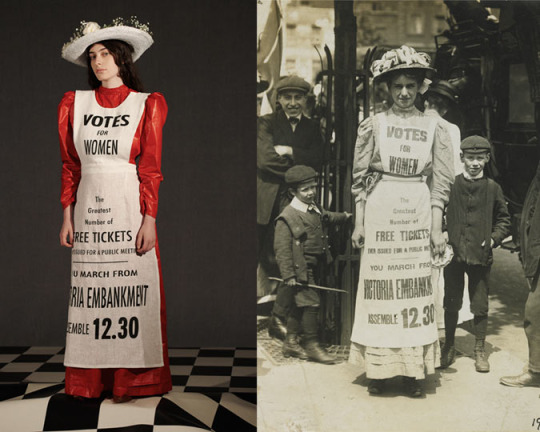
Suffragette Vera Wentworth in 1909, and the dress by Vaquera that it inspired
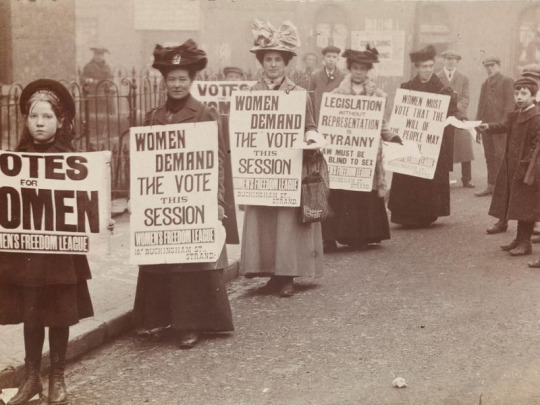
Stonewall riots 28 Jun 1969 – 3 Jul 1969 The Stonewall riots were a series of spontaneous demonstrations by members of the gay community in response to a police raid that began in the early morning hours of June 28, 1969, at the Stonewall Inn in the Greenwich Village neighborhood of Manhattan, New York City.
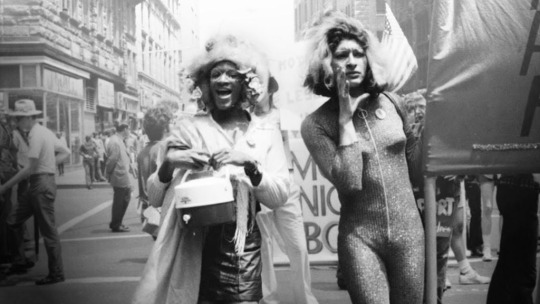
It is said that Marsha P. Johnson was the one who started the rebellion. Supposedly, throughout the bustle of the raid, Marsha threw a shot glass into a mirror and shouted, ” I got my civil rights!”. With this inspiration and resistance against the police, other patrons began to follow.
Present day- Me Too movement.The Me Too movement, with variations of related local or international names, is a social movement against sexual abuse and sexual harassment towards women, where people publicize allegations of sex crimes.


The Punk Rebellion
the punk involved no protests or riots, it impacted people, fashion, music, society and everything to be honest.

The punk subculture advocates a do-it-yourself (DIY) ethic. During the subculture's infancy members were almost all from a lower economic class, and had become tired of the affluence that was associated with popular rock music at the time. Punks would publish their own music or sign with small independent labels, in hopes to combat what they saw as a money hungry music industry. The DIY ethic is still popular with punks.ideology's of punks
Ideology
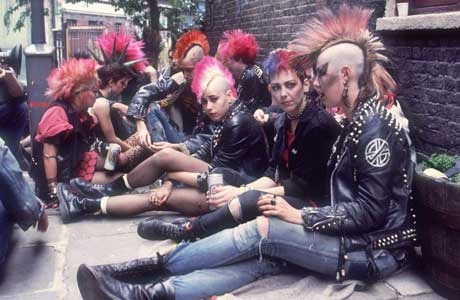
Punk political ideologies are mostly concerned with individual freedom and anti-establishment views. Common punk viewpoints include individual liberty, anti-authoritarianism, a DIY ethic, non-conformity, anti-collectivism, anti-corporatism, anti-government, direct action and not "selling out".
Some groups and individuals that self-identify as being a part of punk subculture hold right-wing views. The belief that such views are opposed to the original ethos of the punk subculture, and its history, has led to internal conflicts and an active push against such views being considered part of punk subculture at all. Two examples of this are an incident during the 2016 American Music Awards, where the band Green Day chanted anti-conservative, anti-racist, and anti-fascist messages, and an incident at a show by the Dropkick Murphys, when bassist and singer Ken Casey, tackled an individual for giving a nazi-style salute and later stated that nazis are not welcome at a Dropkick Murphys show. Band member Tim Brennan later reaffirmed this sentiment. The song "Nazi Punks Fuck Off" by hardcore punk band Dead Kennedys has come to be considered an anti-nazi anthem.
VIV WESTWOOD
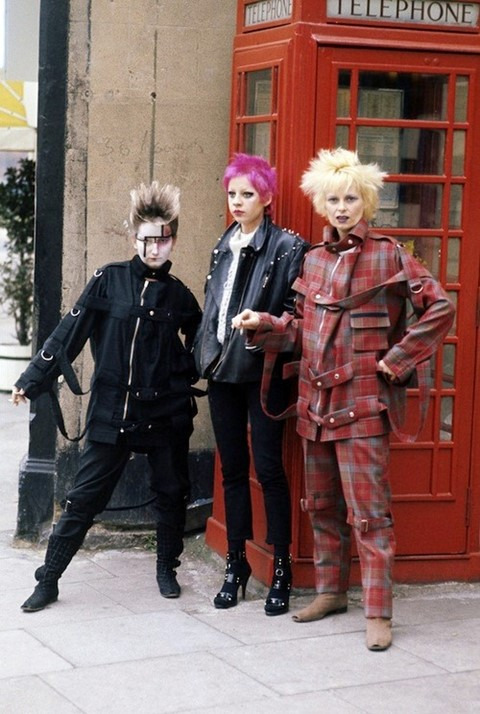
Rejecting the hippie ethos that was fashionable towards the end of the 1960s, Westwood and McLaren created clothes that referenced youth culture's recent past, selling rock'n'roll fashion in a shop unit at 430 King's Road in Chelsea. In 1974, the shop took on its most notorious identity: SEX, with Westwood and McLaren designing fetish wear that they sold to prostitutes, those with 'underground' sexual tastes, and young proto-punks brave enough to take a seriously edgy look out onto the street. The pair enjoyed shocking people, designing garments and shoes that referenced 'deviant' sexual practices, including rubber dresses and stilettos bristling with spikes.

How punk influenced me, because it influenced the world
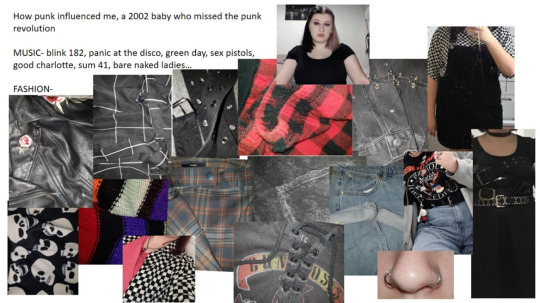
My take on rebellion
Westwood inspired tights.
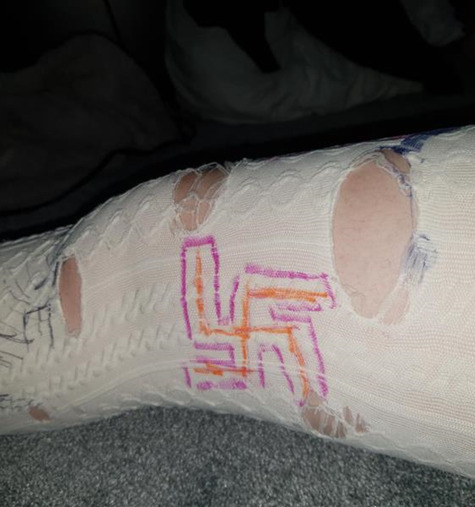

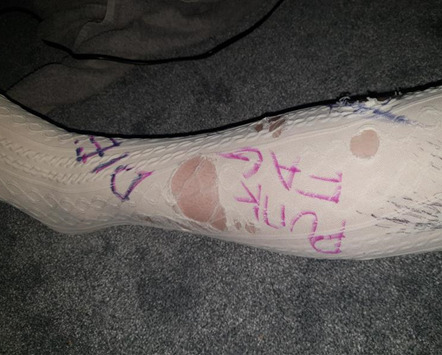
after watching a documentary on vivien westwood and the birth of the punk revolution i created some westwood inspired tights as a little spontaneous brainstorm, did not develop any further on the tights.
i used a pair of brand new white tights and put holes all in them, this is non conformist as if a regular pair of tights had a hole you would bin them as they were no good any more, but purposely putting holes in is quite rebellious in that aspect, i used sharpies to draw triggering symbols and words such as a swastikka and ‘punk fag’ .
crayon drawings
i used crayons to create these images as i thought it was a more rebellious medium and its created for kids so that is non conforming and it gives a rough diy finish look making it look slightly unfinished

i created a lesbian nun, this was a spur of the mind thought whats socially good and respected? a nun? whats the opposite of what a nun preaches, homo behavior.

here i did a little barbie series drawing from observational on one and on another from mind and another from an image which i created by burning a barbie ehich is quite a rebellious act in a way.


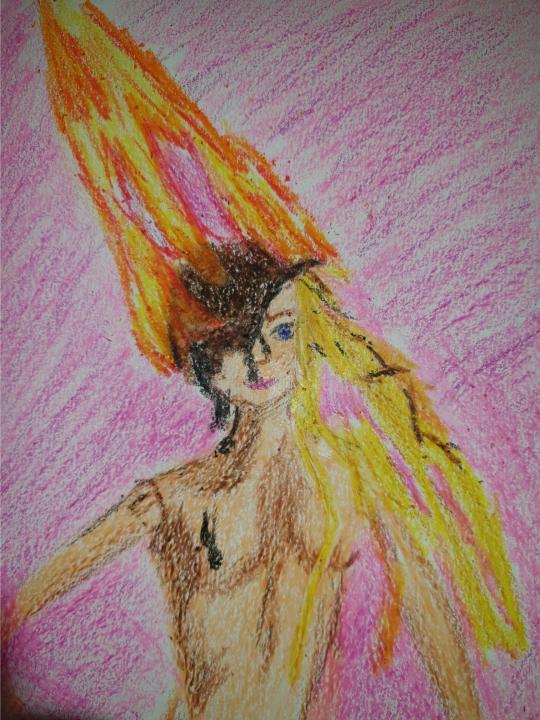

Collages
i decided to do some collages as its a way of just slapping ideas out in a visual format, my first one was using a fashion magazine and i realized this was the way to go so i printed some punk imagery and even used my own crayon drawings to create more collages.

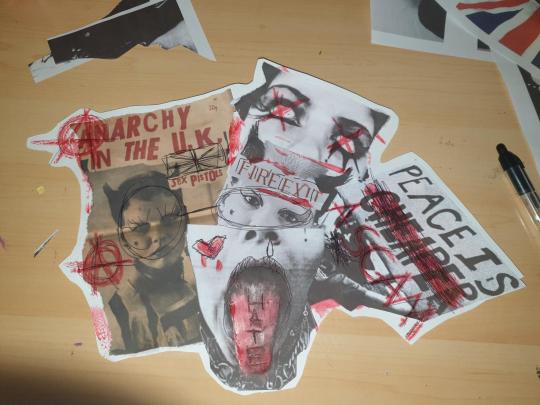

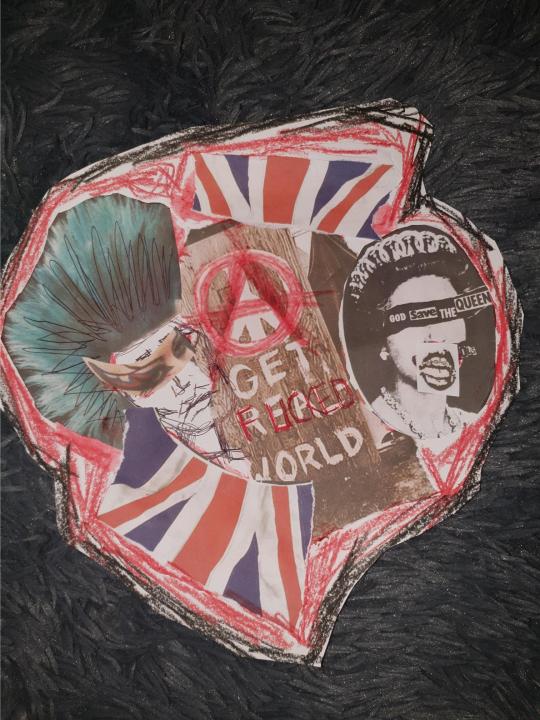
photo shop
i wanted to mess with these collages more on a digital format so i put them in to photo shop to play with them and generate more ideas this was giving me a poster vibe which reminded me of punk posters.
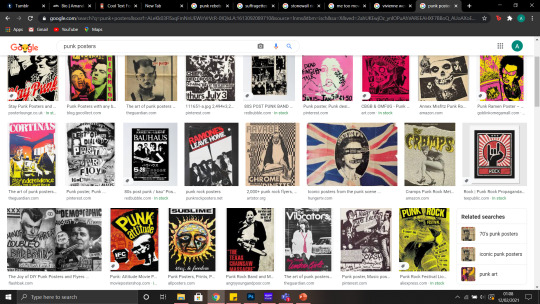
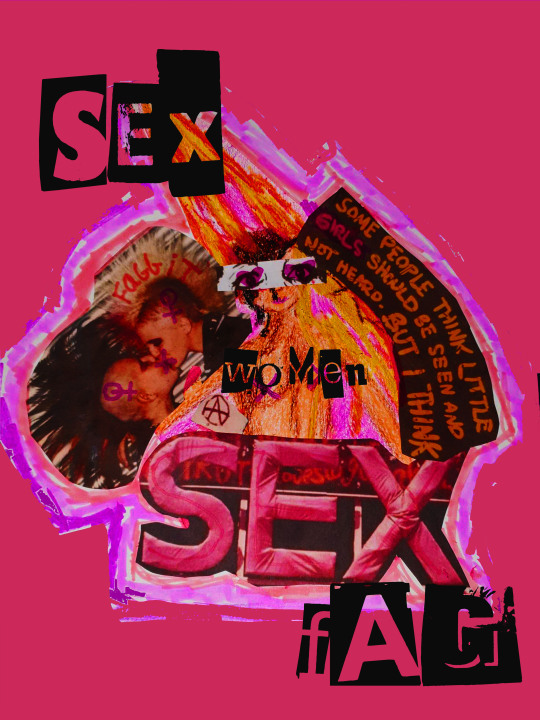
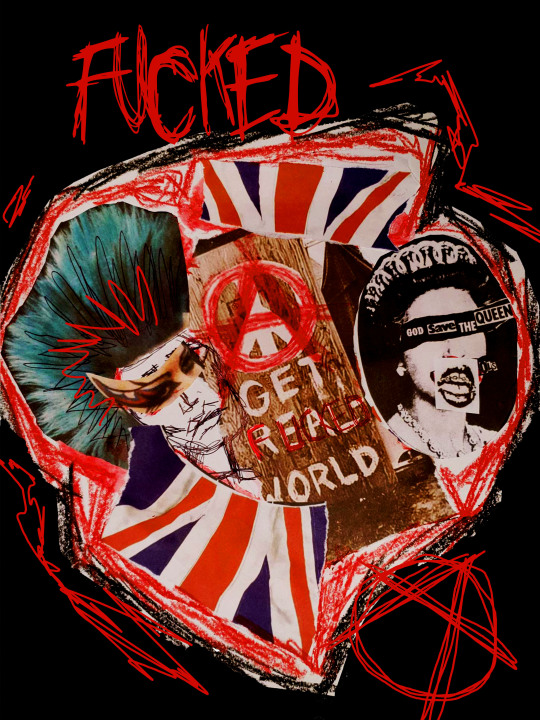

Final ideas
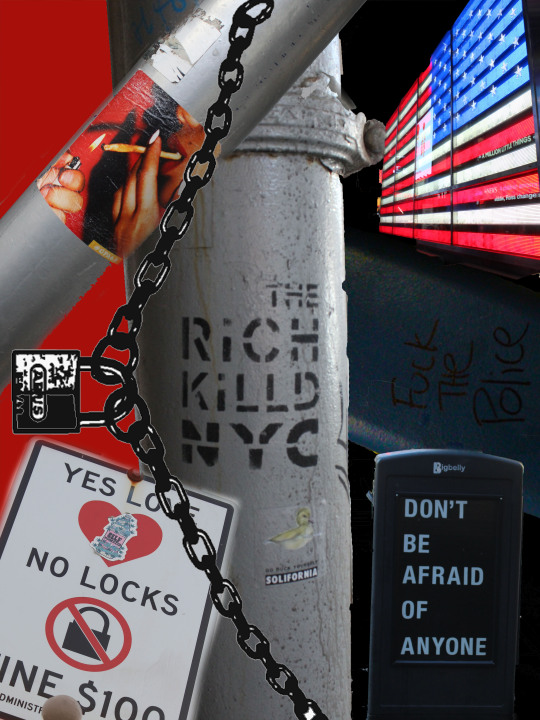
i used images from the new york trip to create a vision on photo shop, using a light of the american flag,sign posts, bins with posters on them.a clip art image of a chain and lock,street art and stickers i saw on poles in the street which is another form or street art which is quite rebellious as its not socially acceptable to vandalize and graffiti on public areas.

i took a few elements from the last board and included them in this vision board, i really wanted the main focus to be on the pipe that says “the rich killed nyc” i feel like it has a deep meaning behind it and it is quite rebellious as it reminded me of the punk rebellion in the uk as it was mostly lower class working people who used art, music and fashion to rebel against society and social constructs and actively non conform to the “rules” in a way. i also used a sticker that says jesus loves you and i crossed it out and wrote hate you over the loves you part as that is fitting to my rebellious visions.

in this board i again used “ the rich killed nyc” pipe as that’s my main surrounding element, i uses another pole with stickers on though you cant really tell what the stickers are, it just fits the aesthetic. i used a statue of liberty as she is known as a symbol of freedom, and along side it i used a photo of a photograph i saw in the modern art museum where this person had dyke tattooed on their neck which is a derogatory word to gay women, and that’s quite rebellious to take a bad word and own it by tattooing it on your body .
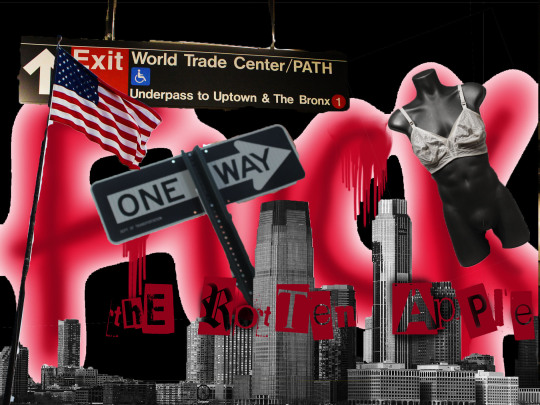
in this board i moved away from “the rich killed nyc” pipe as i felt i needed to come away from that one element for one board and to broaden my ideas. in this one i used a sky line image i took when on the ferry to liberty island, i changed the colour to black and white as the original colours of the image are quite blue and orangy, i used a sign post that says one way as it for some reason reminded me of like “one way to hell” or something and that there feels like there is no choice or individuality in the phrase “one way” . i used text over the sky line that says “the rotten apple” as new york city is known as the big apple and i thought, when i was there it did not remind me of a big fresh beautiful apple as the homeless people on the streets and the graffiti that has no artistic intent, so it was more of a rotten apple in a way. i used an image of the american flag i took on liberty island as i used an image of an american flag light, so i thought i could link back to that idea and use an actual flag, as its to represent freedom. i also used a art piece from the modern art gallery which was just a male mannequin wearing a bra which does not fit the social constrict of what men should wear there for its quite rebellious and opposite to the one way system.
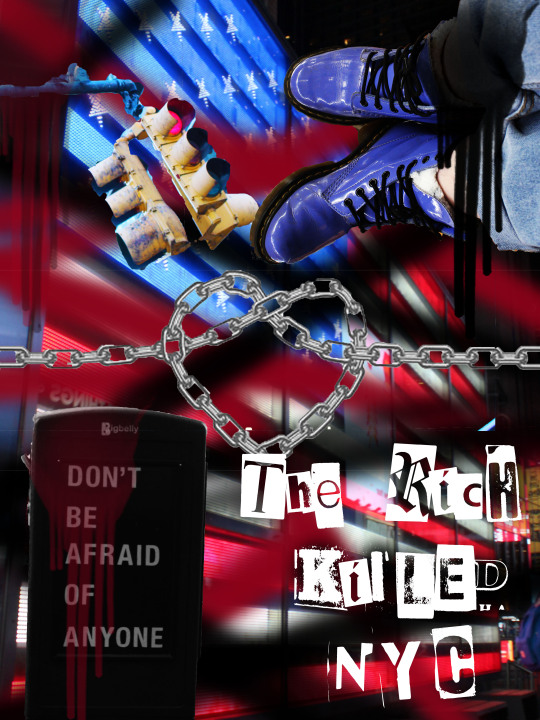
in my final board i included the american flag, a chain over it completely doing the opposite of what the flag means which is freedom, i used the bun that says don’t be afraid of anyone with an edited red paint drip on it which kind of looks like blood, i used text that says “ the rich killed nyc” as i loved that phrase bit i over used the pole in the other boards and i liked that my main message is that the rich killed nyc, i used an image of my dr martens that i took while my feet were up against a pole as i sat on a tube, showing anti social behavior basically which is stereo typically rebellious,and also dr martens were quite fashionable in the uk punk rebellion so i’m hinting to my idea that was inspired by the uk punk rebellion, and finally i have a set of traffic lights which are about order and control, the light is also on red which signifies danger, and the word stop which fits to my idea.
11 notes
·
View notes
Text
What Went Wrong With Clover and Qrow: The Writing Pt. 1
And What CRWBY Could Have Done Better
[Spoilers for all of RWBY Vol. 7]
Now that the final episode for RWBY volume 7 has aired (for first members, at least) and I’ve had over a week to throw my tantrum and air my more emotional grievances, I think now is the perfect time to delve into the mechanics of what I believe went wrong when it came to episode 12, particularly in regards to the writing itself. For those of you who have been following my blog for any length of time, it should come as no surprise to you that in order to do this, we have to go all the way back to the beginning of the volume and break things down. For the rest of you... this is going to be a long post. In fact, it ended up being so long, I’m going to break it down into four parts, focusing on three episodes each up to episode 12.
There are a lot of layers to the anger and hurt surrounding Clover’s death. And while my emotional reaction is still very much there, I really do want to take the time to do this so that people can better understand at least one of those layers. I won’t be getting too much into the shipping aspect in this post or even the queer coding that I personally perceived in Clover’s character. Rather, I’m going to be analyzing the writing decisions and offering my personal suggestions for how CRWBY could have tweaked things to make the events in episode 12, as they happened, far more feasible (i.e. foreshadow Clover’s behavior and remove the flirting, primarily).
Note: This is a critique. I’m not going for negativity here but rather for constructive criticism, where I’ll be acknowledging what CRWBY did well alongside what they could have done better. If you read to the end of part 4 of this series, you’ll find that even after everything, a part of me still very much wants to give CRWBY the benefit of the doubt.
So, without further ado, here we go.
Episode 1 - Clover’s Introduction
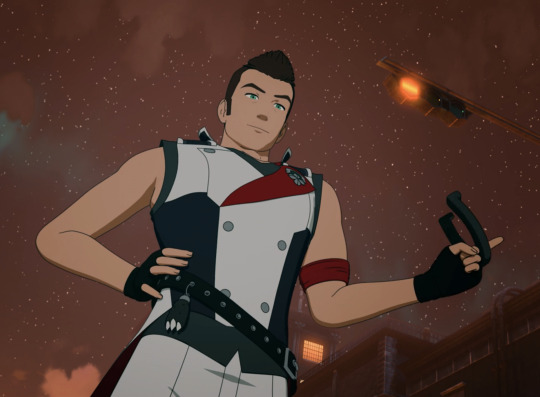
I made a whole post breaking down and analyzing Clover’s introductory scenes in episode 1 where I focused pretty heavily on the animation and the framing. You can read it here if you’d like, but to summarize, the way these scenes play out makes it very clear that Qrow and Clover are going to be linked somehow. These scenes worked, and even in light of the events in episode 12, they still work because things are left pretty open. We have no idea if Qrow and Clover are going to like one another, much less get along to any degree. We just know that we, the audience, are meant to connect them. These scenes, in fact, were done incredibly well.
As far as writing goes, they don’t say a whole lot to one another. In fact, Clover doesn’t speak to Qrow directly at all and the only thing Qrow says is:
“Hey, pal, I’m a licensed Huntsman. Just helped save everyone?”
So... pretty par for the course there. Nothing that really needs to be addressed. This is totally something we expect Qrow to say.
So let’s take a look at Clover’s dialogue. I don’t want to quote every single line, at least not in this particular scene, so I’ll just pull out a few that I think do a great job of setting up his character.
In response to Dr. Polendina asking what the Ace Ops are doing in Mantle:
“Well, we heard a report of an unauthorized ship making an unauthorized landing, followed by an unauthorized use of weapons by non-licensed Huntsmen.”
In response to Dr. Polendina wanting to talk it out:
“They’ll be able to talk this out once they get up to Atlas.”
This is a fantastic bit of writing because it establishes several things at once.
1) Clover is lawful good. The reasons he lists for being there, and the way he emphasizes the “unauthorized” nature of it all, makes it pretty clear that he’s there to do his job. He doesn’t respond to Qrow or even check him for a license, and he rebuffs Dr. Polendina’s desire to talk things out right there. Clover arrests the teams because in his eyes they were breaking the law, and that’s all he really needs to know.
2) It sets him up as Qrow’s opposite in ideology, which is a great way to mirror the opposite Semblance reveal later.
3) It also introduces the possibility of negative tension between him and Qrow. The problem with this is that this tension is never once realized throughout the rest of the volume. In fact, the complete opposite happens and they get along very well. My biggest critique here is that CRWBY absolutely put themselves in a position where episode 12 could have made more sense but then never took it anywhere. Instead, they focused on building up their relationship as a positive thing.
Problem Tally For This Episode: 0.5. There’s really nothing I would have changed about this particular scene because I think it was very nicely done. Things are introduced and set up but left ambiguous enough that we have no idea how things between Qrow and Clover are going to go. The 0.5 is an acknowledgment of the potential set up for the episode 12 conflict that went unused.
Suggested Changes Tally For This Episode: 0
Episode 2 - Making Amends

(^^ I had to go with this screenshot, Clover’s expression is way too good XD)
The end of episode 2 is the first time we see Clover and the other Ace Ops since they arrested the main cast down in Mantle. And... this is where things start to go wrong. Or, perhaps it would be better to say, this is where things could have gone differently. While Clover and Qrow don’t interact in this episode, there are still some key decisions made in regards to Clover’s character.
I’ll pull out the relevant lines and analyze them as we go, then offer up my suggestions for changes.
When the Teams come down the stairs after their meeting with James, Clover approaches them and says:
“I’d like to sincerely apologize for the miscommunication down in Mantle. We didn’t intend to-”
We never learn what it was they “didn’t intend” to do because Elm cuts him off when she practically body-checks him out of the way 😆 But the wording of this line immediately shifts our perspective on Clover a little. He’s no longer behaving like the stringent, unapologetic law enforcer, but is instead acknowledging that he and his team probably messed up a little by not listening/talking to the Teams. It’s a small thing, but it’s our first hint that while he is lawful good, he is by no means unreasonable or unreachable. Contrast him with Cordovin in volume 6 who listens to absolutely nothing, doesn’t apologize, and never budges in her determination to stop the Teams until she has no other choice.
Now, because writing often relies on the tension between various characters’ lines, and because characters are often defined by those around them as much as by what they themselves say, I think it’s important to have a transcript of the following exchange between Ruby, Weiss, Elm, Marrow, and Clover:
Elm: I feel so bad, honestly! If we had known who you were, we’d be laughing over a hot meal right now and--
Ruby: I understand. You were just following orders.
Weiss: I mean, you could have asked us some questions first.
Marrow: Questions are for the weak, but we’re all on the same team now. Not that I’m happy about it.
Clover: We just wanted to say we’re sorry, and that we’re looking forward to working with you on our next mission. You might be students, but you’ve been fighting just as hard as we have, if not harder.
There’s quite a bit to tease out here. Some of it good, some of it not so great in terms of the larger picture and the events in episode 12.
First of all, Elm apologizes. This functions as a reflection on Clover. Good writers find ways to define and build character through the people around them as much as from the character’s own actions and behavior. As the team leader, you expect Clover’s teammates to have picked up on some of his more prominent characteristics and ways of thinking. The fact that Elm not only apologizes but insinuates that knowing who the Teams were would have changed the decisions made in Mantle, suggests a certain level of flexibility. It can also be argued that this foreshadows the fact that at least one of them will go through a change thanks to their association with the Teams. On a deep writing level, that foreshadowing is there, and I’ll make an argument in just a second for why Clover is set up to be that changed character.
But first, let’s look at Ruby and Weiss’s lines, which both serve well to introduce the fundamental difference between themselves and the Ace Ops: “make it up as we go” RWBY, JNOR, and Qrow as opposed to “arrest now ask questions later” Ace Ops. This is good. This works well as the first hint that conflict between them is possible. I have no complaints here.
And then we get to Marrow’s line. This is where things get a little murky but maybe that was the intent. He’s definitely posturing for his team, which is behavior that he exhibits throughout the volume. As the youngest member and the only Faunus on the Ace Ops, this line does a good job of exhibiting that he really wants to fit in with the others, and as such it also doubles as a second peek into the “ask questions later” ideology that the Ace Ops hold as a group. Which is probably something that trickles down from Clover himself, considering he’s the leader. This, also, is fine and works well.
But then....
Clover apologizes again. He doesn’t correct Marrow but doesn’t agree with him either. He doesn’t acknowledge Marrow’s assertions at all. He apologizes to the Teams and this simple act works to reinforce the shift in our perception that he’s possibly more flexible and open to admitting his own mistakes than we might have thought in his episode 1 introduction. And this is the very beginning of the dissonance so many of us felt in his behavior in episode 12.
Suggested Change #1:
My first suggested fix is to change the way that Clover’s second apology is framed by changing his initial apology. Even though he gets cut off by Elm, his first instinct is to apologize for the miscommunication in Mantle. Not only does this tie in so well with one of the primary themes of the volume (miscommunication in all its manifestations), it also indicates that Clover’s character itself is tied to that theme. But his acknowledgment that they probably should have asked some questions immediately frames him as a character who is going to change in terms of that theme. The “we didn’t intend to--” part only adds weight to this hint.
So how could they have fixed this? There are a multitude of possibilities but here is the best I came up with:
>>“I’d like to sincerely apologize for what happened earlier. We were only--”
Do you see the big differences here? Two major things change by altering only a few words. First, in this line, Clover does not acknowledge that he and the Ace Ops made a mistake by not asking questions. He’s still be apologizing for what happened but he's not admitting any fault on his or his team’s part. This would have reaffirmed our initial impression of him as a rigid rule follower, rather than dismantling it a little. Second, the “we were only” would have indicated that, despite his apology, he planned to justify their actions. Again, this would have worked very well to maintain the strict lawful good vibe we get from him initially. These minor alterations would have been subtle enough but strong enough to continue building up to the conflict between him and Qrow in episode 12.
Suggested Change #2:
If you don’t want to change that initial apology, change what he says after Marrow speaks. Have him acknowledge Marrow’s assertions that questions aren’t their thing. You could even have done this through animation with a slight nod or a laugh, but since we’re talking about writing, here is one suggestion:
>>“In our line of work, taking the time to ask questions can sometimes be dangerous. I’m sure you can relate. Regardless, we just wanted to say we’re sorry.”
Again, do you see the difference between this and what we got? What we got brings out the possibility that Clover is somewhat malleable. This, on the other hand, effectively but subtly reinforces his “by the books” mentality, which is exactly what CRWBY needed in order to justify his behavior towards Qrow in episode 12.
I have no suggestions for changes to the lines of the other characters. I think those lines function well in pushing against each other and maintaining a level of tension all around, and they’re necessary for building up to the RWBY vs. Ace Ops conflict. But two very minor and simple changes to Clover’s lines would have continued that initial setup for the episode 12 conflict that was established in episode 1. Instead, CRWBY starts to dissolve it from the get-go.
Problem Tally for this Episode: 1 The biggest problem in this episode is really that Clover’s character immediately starts to shift from “strict inflexible rule follower” to someone who can admit he made a mistake and should probably behave a little differently in the future.
Suggested Changes Tally for this Episode: 2
Episode 3 - Aaaaaand Here We Go
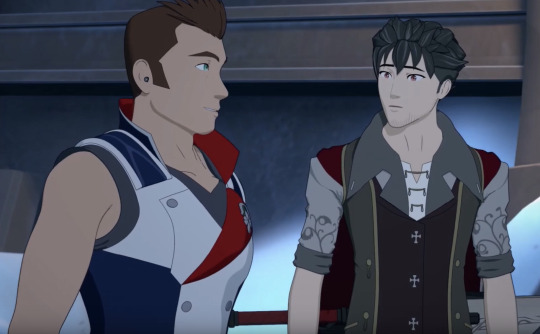
This section is going to be loooong. Not only do we get a lot of Clover in this episode, but we get a ton of him and Qrow together. In other words, we get the first beats of their relationship (again, I won’t be arguing for the shipping aspects, because I’ve done that in other posts and you all know where I stand on that, but their relationship, regardless of its nature, is vital to this analysis).
The first scenes we get in this episode are of Clover briefing Qrow, Jaune, and Ruby about the mission. A lot of it is pretty basic and does a good job of establishing him as an organized, efficient military leader. He’s clearly smart and knowledgable with his strategy.
The first line that really stood out to me in this sequence is the one where he is talking about the Geist:
“But recon has identified a powerful Geist that’s managed to evade destruction and take several lives.”
And this pretty much just serves to establish that lost life is a concern for him. A very good thing to know. It adds a little depth to his character.
After this, we get:
“General Ironwood says you’ve seen your fair share of combat. I trust that man with my life, so tomorrow, I’ll be trusting you all too.”
This is actually a great line for a lot of reasons. First and foremost, it establishes his trust in and bond with Ironwood. It’s a line that gets a lot of emphasis both in delivery and in terms of placement (it comes at the end of his monologue), and it’s one that returns in episode 12 as a sort-of justification for Clover’s actions. This particular line also suggests that his trust in the Teams and Qrow, as of this moment, is dependent upon Ironwood’s opinion of them. He trusts them because Ironwood has vouched for them and not because he has any reasons of his own to do so. This actually works really well and I wouldn’t suggest a change.
The problem in the narrative again comes from what happens outside of this line. The tension suggested here is never carried forward or built upon. In light of this, and because of the direction his relationship with Qrow takes, this line doesn’t work well as a foreshadowing of his actions in episode 12. Rather, its narrative function falls more in line with hinting at the potential for change that was introduced in episode 2. It does do a good job of setting up Clover as the one who is going to have to make a choice between his absolute trust in Ironwood and something else (whether that’s his own judgment or his trust in Qrow or whatever), but because of the writing outside of this line, it completely fails to build up to the events in episode 12 in a way that is convincing. In fact, it does the complete opposite. Because of this line and the way Clover is written in the rest of the volume, we are set up to expect an internal struggle from him in episode 12, not blind obedience.
Moving on to the scene where he and Qrow have their first one-on-one interactions. As you can probably predict, here is where things start to go to absolute shit. Up to this point, CRWBY still had what they needed to pull off episode 12 without it feeling ridiculously contrived. Sure, they played around with Clover’s character a little, gave us enough nuance in his narrative to potentially pique our curiosity, but they hadn’t passed the point of no return yet. Here, however, is where they start to.
Because of that, I’m going to quote large chunks of the script between Qrow and Clover, and pull it apart as best I can. Here is their very first conversation of the entire volume:
Qrow: Gotta say, I’m still not really used to working with other Huntsmen in the field.
Clover: But you were on a team before, weren’t you?
Qrow: (sighs) Long time ago. I just found working alone tends to be for the best.
Clover: Well, I think that’s a shame.
[Qrow slips and nearly falls before Clover catches him.]
So there are actually quite a few things going on here and they all contribute to the overall problem with the writing in this volume.
First of all, despite Qrow’s previously established dislike for the Atlas military in earlier volumes, and despite being arrested by Clover in episode 1, there is zero animosity or negative tension here. He seems more than willing to work with Clover and is even comfortable enough to initiate conversation and open up a bit. There is nothing of plot relevance in this scene. It is solely and specifically meant to give us the first hint of what their relationship is going to be like.
The major problem I have with this, in terms of the overall story that pans out between these two, is that CRWBY already had an inbuilt way to introduce a little negative tension. They could have easily called back to Qrow’s not-so-great opinions about Atlas military huntsmen, even if not overtly, and that would have worked really well as a stepping stone to the episode 12 conflict. But that’s not what we get.
Instead, Qrow opens up about something personal (being alone) and Clover is shown to be sympathetic. Clover’s sympathy here is another major mistake made by CRWBY when we take into account one of Clover’s lines in episode 12. I’m not going to watch it right now to get the exact wording, but it’s something along the lines of “There’s that cynicism of yours”. It’s a line that comes across as cruel and impatient, and it comes out of absolutely nowhere thanks in particular to the exchange above, their interactions later in this episode, and the episode 5 truck scene.
Right here is where CRWBY had the opportunity to at least partially rectify that very specific problem, but it doesn’t happen. We are given no indication that Clover thinks any less of Qrow for this reveal, and are instead given a glimpse at the patience and kindness that he is capable of.
Suggested Change #3:
The easiest way to fix this would have been to remove Clover’s sympathy, or at least insert a little condescension into it. This could have been done without making him an outright ass, and therefore CRWBY would have been able to keep us invested in at least wondering where this is going to go between them while simultaneously giving us one of the hints needed to make episode 12 believable. All it would have taken was altering Clover’s final line in that exchange.
Here are a few possibilities:
>> “Hmm” - delivered in a way that communicates his judgment or at least something noncommital
>> “That doesn’t seem like a good idea.” - critical
>> “That’s a bit much, isn’t it?” - dismissive, condescending
>> “I have a hard time believing that.” - dismissive
>> “Is that right.” - dismissive, condescending
>> He says nothing and it’s up to the animators to communicate his judgment.
Suggested Change #4:
The slightly more difficult change they could have made here would have been utilizing Qrow’s established distaste for authority and the Atlas military in general. Here is one potential way that could have gone:
>> Qrow: Gotta say, I’m still not really used to working with other Huntsmen in the field.
Clover: But you were on a team before, weren’t you?
Qrow: Long time ago. Playing with others isn’t really my thing. I found working alone tends to be for the best.
Clover: Well, I think that’s a shame.
In this case, you could keep Clover’s last line because instead of Qrow opening up and being vulnerable, he’s actually being a bit more antagonistic, which would have been plausible given his behavior towards Winter and James in volume 3. Clover’s line, in this context, becomes much more ambiguous and open to interpretation, which would have fed well into the episode 12 build-up.
Moving on again to their next interaction in the mines right after the Geist escapes:
Clover: Thaks for the call-out. That could have been bad.
Qrow: (sighs) I wouldn’t thank me. My Semblance brings misfortune. Sometimes I can’t keep it under control.
Clover: That so? Well, hey, don’t beat yourself up about it. My Semblance is good fortune. Lucky you, huh?
Again, there is quite a bit going on, not only in these lines but in the lead-up as well, so in order to maintain perspective, I’m going to backtrack just a bit to when Clover caught Qrow after he slipped on the ice. The next major beat in their relationship after that event is Qrow warning Clover to prevent him from getting crushed by a falling beam.
These two things paired so closely together suggest that real trust is starting to develop between them. It’s not trust vouched for by someone else, but the trust that comes from being in a dangerous situation together and coming through for one another. At the bare minimum, the foundation for trust is laid here and with nothing to undermine it (because of the writing thus far), there is no reason for the audience to doubt that it will continue to develop and strengthen.
Then we have the lines above.
Again, Qrow opens up about something deeply personal here. He is showing unusual levels of vulnerability for him, which suggests that even if the audience doesn’t quite understand it, Qrow has found a reason to want to open up to Clover. It points towards an immediate level of comfort that we have never seen from Qrow before and that is something that can’t be ignored.
As for Clover, I suppose we could argue about the nature of his response to Qrow’s vulnerability. I know some saw it as Clover being dismissive of Qrow’s pain, and if that had been how the lines were delivered, this might have worked very well in building up to a conflict between them. This is one instance where we need to step outside the words themselves and take into consideration the aspects surrounding the words: the animation and Chris Wehkamp’s line delivery in particular (which I assume were directions written into the script).
One of the biggest problems here is that this was yet another opportunity for Clover’s impatience with Qrow’s cynicism to be established. And yet again, that’s not what we get. Instead, Clover takes Qrow’s Semblance in stride, reassures him that it’s not something he needs to worry about, and then offers up a comparable piece of information about himself: his Semblance is good fortune. There is no indication in the writing, line delivery, or animation that he finds Qrow’s attitude distasteful or annoying, and there could have been.
The other major problem with this is, again, the nature of Clover’s final line. I promised that I wouldn’t get into the shipping aspect and I won’t, but at the very least I think everyone can agree that the “Lucky you, huh?” quip at the end is intended to be friendly. This is the first time we learn something personal about Clover and it’s also the first time that his behavior towards Qrow shifts from being purely professional to something else. This shift is maintained and built upon throughout the volume and I’ll comment more about it in just a bit.
None of this builds up to what happens in episode 12. CRWBY lays the foundation for a healthy and functional relationship between these two, hints at the beginnings of real trust between them, and completely foregoes all opportunities to insert some of the negative tension that was sorely needed for episode 12 to make sense.
Before making some suggestions for changes, I’d like to take a second to really emphasize this point: prior to these two scenes, the audience has little to no reason to believe that these two are going to get along. Clover is elite Atlas military and Qrow is... well, Qrow. We already knew everything we needed to know about them to make the inclusion of that necessary negative tension ridiculously easy. All CRWBY had to do was play them off one another in a way that leaned on this prior knowledge. This is not only sloppy writing in light of episode 12, but this is also the active and intentional subversion of our expectations where these two characters are concerned. This puts us into a bit of a quandary, really, because how can something be both careless and yet so intentionally done? It’s not a question I’m going to try to answer here but I think it’s one worth keeping in mind as we move forward.
Suggested Change #5:
Remove the friendly/flirty nature of Clover’s final lines and instead write them in such a way that he seems a little more callous and irritated with Qrow’s attitude. Again, he doesn’t need to be such a jerk that we hate him off the bat, but including a little hint of negative emotion would not have been difficult here.
For instance:
>> Clover: That so? Well, don’t worry about it. Luckily, my Semblance is good fortune.
See how different that is? Dismissive, potentially irritated, and it brings the focus on to Clover and his Semblance rather than putting the focus on Qrow and what a good fortune Semblance might mean to him, which is how the original script functions. The very last line that I suggest also serves to put Qrow down a bit in a very subtle way rather than having Clover flirt with/be friendly towards him. It’s basically a “whatever, things will be fine despite the fact you’re here”.
Moving on from this, we get the following:
Clover: Charlie, Bravo, you should be able to cut off the target at the heart of the mine. Qrow and I won’t be far behind.
Again, this line is a relatively small thing all on its own, but in context with the scenes that precede it, there is actually a lot more going on here than might appear at first.
I didn’t quote it, but when Qrow and Clover first land at their assigned mine entrance, Clover refers to himself and Qrow as “Alpha Squad”. Here, that changes to “Qrow and I”.
Not only does this support and reinforce the change in Clover’s attitude toward Qrow with the “Lucky you, huh?” line (going from professional to something else), but Qrow is specifically named. There is not only an inherent intimacy that comes with using a person’s first name, but it’s a very subtle and effective way of framing Clover and Qrow together as a pair. This further feeds into that set-up I was talking about in episode 2 where Clover is presented as the most likely character to change as a result of his association with the Teams/Qrow, particularly in the absence of negative tension and the efforts by the writers to subvert our expectations in that regard.
Do you see where things are starting to stack up in the completely wrong direction? It gets worse in just a minute but first...
How do you fix this? Again, it’s easy. Considering Clover is military and codenames are a thing heavily used, it would have made more sense for him to at least refer to the two of them as “we” or even revert to “alpha squad”.
Suggested Change #6:
Make a slight alteration to Clover’s line so that he reverts to pure military professionalism.
>> Clover: We won’t be far behind.
>> Clover: Alpha squad won’t be far behind.
Pretty simple. Either change works. Even though the shift that comes with “Lucky you, huh” would still have thrown us off a bit, Clover’s return to his norm would have signaled to the audience that the perceived change was fragile at best, and possibly even a complete fluke of Clover’s personality. It also maintains a level of emotional distance between Clover and Qrow that we really did need for episode 12 to work. Instead, CRWBY made the choice to close that distance. Significantly.
Now it gets worse. We go into the scene in the main chamber where Clover and the Ace Ops take down the Geist. The obvious bit of dialogue here that merits attention is Clover’s following line after catching the piece of Dust in reference to the other Ace Ops:
Clover: What would you guys do without me?
I think this line might be one of the most disappointing because it could so easily have foreshadowed Clover’s death. But instead, due to what came just before and what comes after, this line sets up an entirely different conflict. In fact, it does a beautiful job of pretty much cementing Clover as the character who will change the most because of Qrow and the Teams, and who will have to choose between Ironwood and his own moral code. Do I suggest that from here on out, him choosing Qrow over Ironwood was absolutely set in stone? Not at all. In fact, that wouldn’t have made sense for the narrative or Clover’s character. However, Clover’s unflinching blind obedience and immediate willingness to arrest Qrow in episode 12 are completely undermined by this set-up. We expect to see him struggle with that decision, regardless of the ultimate outcome, not turn into a drone who does exactly what he’s told.
Additionally, thanks to the set-up we get throughout the volume for the RWBY vs Ace Ops fight, this line feeds into that tension in particular. The problem here is that the second we see the Ace Ops act to arrest RWBY without hesitation, this tension is resolved and we have our answer. We know exactly what they do without him and all that’s left to see is the unspoken second half of this question: What would Clover do without them?
If I could include an illustration of how far CRWBY was leaning away from foreshadowing Clover’s death and callousness in episode 12 up to this point, we’d have ourselves a goddamn Tower of Pisa.
There is no specific fix here because the problem isn’t with this line itself. It certainly could have functioned to foreshadow Clover’s death, but again, because of the rest of the narrative, that’s not what it ends up doing.
I want to step away from the dialogue for just a moment. I know I said I wouldn’t be focusing on animation, but considering animators take their directions from the script and storyboards, it does technically qualify as writing even if I can’t give you word-for-word what those directions were. There is something in the animation in this particular scene that we can’t ignore.
Clover’s behavior directly following the line above (he tosses the Dust to Qrow, gives him a loose and playful salute, and backward swan dives off the cliff into the pit where the Geist is) is a massive, screaming augmentation of Clover’s shift towards Qrow specifically (i.e. away from strictly professional and towards something else). The “lucky you, huh” line and the use of Qrow’s name right before this pulls us very nicely into this new dynamic.... But this dynamic is exactly the thing that makes episode 12 so outlandishly out of place.
Moving on to the final Qrow/Clover interaction for this episode. After the Geist has been defeated and Ruby makes the day-saving catch, we get this:
Qrow: Lucky catch, huh?
Clover: Hm, no. I’d chalk that one up to talent.
One of my issues with these lines is that they serve to once more highlight the shift that has occurred between Qrow and Clover, particularly because it gives us some invaluable insight on Qrow’s feelings towards Clover’s Semblance. Here is another area where the light-hearted delivery Jason Liebrecht (Qrow’s VA) gave factors in a bit. A lot of us had no idea how Qrow was going to react to learning that someone else had a Semblance opposite to his own. He could very easily have been upset or resentful or even self-effacing, but instead, he absorbs the information, takes it in stride, and proceeds to joke about it in a way that I just realized mirrors Clover’s “Lucky you, huh?” line. This is basically Qrow shifting seamlessly into their new dynamic and accepting it.
The other major problem here is, once again, Clover’s characterization. This has all been building up pretty badly to episode 12, as I hope I’ve illustrated, but this final exchange is really the last good chance CRWBY had to pull things back on track a bit. Only they don’t take it. They could have had Clover display a bit of arrogance or dismissiveness in this scene. It would have worked well to at least let us know that the personality he has displayed so far might be more of a front than anything, and if done right, his coldness toward Qrow in episode 12 wouldn’t have been totally unexpected. Instead, we get to see a man who gives credit where it’s due and absolutely believes that his Semblance is not everything. In other words, we get a Clover who is drastically different from the person depicted in episode 12.
Suggested Change #7:
Change Clover’s final line to clue the audience into the fact that he is not what he seems and hint at a darker personality lurking under the surface. Here are a couple of options
>> Clover: It was.
>> Clover: That’s one way to put it.
Problem Tally for this Episode: 14
Further set-up (at least 2 major instances) for Clover to be the one who changes or at least struggles with having to choose between Ironwood and Qrow/disobeying orders. Multiple instances (3 significant by my count) where Clover’s characterization fails to match what we get in episode 12. A failure to lean into the pre-established negative tension between Clover and Qrow by virtue of who they are. An active subversion of the expectations that could have easily supported that negative tension. The shift in Qrow and Clover’s relationship which is never recanted in any way, followed by no less than 4 instances of reinforcement. The beginning of the closing emotional distance between Clover and Qrow. A line that could potentially have acted as foreshadowing undermined by what comes before and after it.
Suggested Changes Tally for this Episode: 5
Total Problems so Far: 15.5
Total Suggested Changes: 7
Do you see where all the little, tiny things are starting to add up? And do you also see where only a few small changes could have been implemented to make episode 12 something that didn’t hit the audience like a freight train? The thing is, not all of these changes would have been necessary. A few of them would have sufficed.
I hope this has been helpful in shedding some light on a portion of the reason why people are so upset by what happened in episode 12. I’m going to continue this analysis as soon as I can, with the next part covering episodes 4-6. With school and everything I’m not certain how soon it will be out, but look for it sometime over the weekend or at the beginning of next week.
#clover deserved better#fair game#clover ebi#qrow branwen#rwby#rwby7#rwby critique#what went wrong in the writing#blog series
197 notes
·
View notes